|
Tall, slim, moustachioed Mark Allboy took the flight from London to Kuala Lumpur. This was followed by a local flight descending from out of a brightening sky, bumping its wheels on the tarmac of Penang airport. For Mark it was almost a spiritual moment. Silhouetted coconut trees, cloud-angels and sparkling winged birds seemed to bring the mercy of arrival to this tentative traveller. The oven blast of air on exiting the craft, however, was a rude awakening. Uncomfortable moisture ran down Mark’s back, dampening his arms. His friend, Antony Mudaliyar was waiting as Mark exited customs. ‘How's the flight, any descent stewardesses? It’s fan-bloody-tastic to see you. You look great. You must be tired,. How’s Blicton,? I’ve never been back. Do you ever see Cioffi? No I don’t suppose that you do, that was years ago, and that other lecturer, the one who was having all those affairs with the students'. Anthony waved his hand dangerously as he drove and talked on. ‘Rolf, that was his name wasn’t it.’ Anthony talked practically non-stop as he drove Mark straight into Penang’s Georgetown. There, Anthony bought Mark a Western breakfast with all the trimmings including (beef) bacon, Mark thought ‘beef bacon, what heresy is this’, then there were the minuscule fried eggs - American style sunny side up orangey/yellow, and fried, tasteless, tomato as well as cold, hard toast. What Mark really wanted, was his first real taste of exotic Malaysian cuisine! The food on his Malaysian air carrier didn't count. It was to be a pleasure deferred. In England, exuberant Antony had been just another well-tanned Britisher with Indian ancestry. They drank, talked about football, women and spent as little time as they could studying Sartre, Husserl and Heidegger. Together with three others, they were a multi-racial band of brothers, practically indistinguishable one from another, despite they all being from different countries and, some, different religions. It never mattered. In Anthony’s car, the first thing Mark noticed was the small statue of Ganesha (Ganapati – the elephant headed Hindu god) atop the dashboard. Another was the slightly old, and browning string of jasmine flowers hanging from the car’s mirror. Mark wanted to say something. Ask questions. He held back. They had only just met after five years. There would be plenty of time, he thought, for catch-ups, if the Muses were willing. They crossed the unruly Straits of Malacca. The 1920, turmeric tinctured, ferry rose and dipped from Penang Island to the mainland at Butterworth. Despite being tired from the long flight, Mark loved watching the white furling waves emerge from the rear of the ancient ferry, seeing them merge into perspective, disappear like so many of his youthful dreams and fancies. He raised his head, feeling the salty breeze on his cheeks, the smell of ozone in his nostrils and a brief sense of freedom unfettered from his life in the UK. Anthony drove inland from cluttered Butterworth, along windy roads, past the Australian Air Force base, past the green shooting paddy fields and the laboriously slow moving water buffalo. The journey both excited and exhausted Mark. He could feel Jet lag creeping, taking the edge off his experience. The cool of the car’s air-conditioning fought bravely with the mounting heat from outside. It almost won. The interior of the ageing Toyota Carina was a little warmer than cool, warm enough and cool enough to lull Mark to sleep. He dozed the last half-hour of the journey, missing the small town of Sungai Petani and the small shrine to Ganapati. Antony and Bawri’s official line was that they needed a greater space than their small bungalow in Ipoh would allow. But those who knew the couple were well aware of Anthony’s difficulties with games of chance. They had moved from Ipoh to begin afresh. They imposed themselves upon Bawri’s mother, Laksmi, to live down a small lane lined with banana trees, fruiting papaya and towering coconut. It was practically romantic, if somewhat isolated. More sky-reaching coconut trees loomed over the squat single storey house. Banana leaves, waved their large, plush, green skirts in Far Eastern dances to the frequent warm breezes. An old, peeling, metal two-seater swing sat stately on the porch, its white paint revealing darker green beneath. Rust from its ironwork threatened to taint lighter clothes but, perhaps, no more so than the red/brown laterite of the garden. There was garden enough to plant a few bushes of bougainvillea, pink, white and orange bracts which were fading to purplish pink. That night, white, nightly scented, jasmine would perfume the equatorial air around the romantically inclined swing, while swift, fiery, miasmas of fireflies would dance sweet promises under tender moonlit skies. Anthony and Bawri’s was not an ideal marriage. Though a love marriage, there were disappointments. He was a Methodist and she Hindu. They both had fought discrimination in their increasing small town of Ipoh. A strongly willed Bawri, staunchly resisted the pressure for her to convert to his Christianity, ‘if my religion was good enough for my dear departed father, it is good enough for me’ she had pointedly reminded her husband. ‘Wasn’t he Marxist’ Anthony defended, ‘He was born Hindu, and that is good enough for me!’ barked Bawri, closing the conversation to his observations. Anthony had reached for the ever-present bottle of Glenfiddich, scrutinising the measure marks scratched along its side as he poured a generous measure of his favourite Scotch into a cheap glass, and sighed. Anthony’s Toyota exited the small dirt road and entered the compound. The gates swung electronically shut. Though tired, Mark experienced a more than pleasant surprise seeing a slim female waiting in the doorway. Bawri, five foot something, slim, lusciously ebony haired, was wrapped in a remarkably azure sari. It seemed to catch the essence of the morning light as she stood. Flashes of her exposed midriff intensified Mark’s curiosity as he gazed, almost in awe, at the vision she presented to his tired eyes. It was as if some efficacious Asian ointment had been splashed in his face, for he felt as if he was seeing the world for the very first time, a clear, beautiful, world containing the splendidly sculptured form of an Indian goddess, albeit a goddess who was, in actuality, the wife of his friend. Bawri wore a garland of fragrant, white, auspicious jasmine in her hair. It was tied in a careful knot at the back of her gracious head. Mark uttered ‘I.., I’m so grateful for you and your wife for putting me up like this. This place is amazing’. ‘Don’t mention it’ replied Anthony,’ we’re more than happy to have you, Bawri has been waiting anxiously to meet you, but you must be tired after your flight’. Mark was shy to take Bawri’s hand when proffered. It felt cool, strong yet soft and with just the polite amount of pressure. She looked him steadily in the eyes as she said ‘Welcome, I have been so longing to meet you. Anthony has told me all about you’. In that look Mark imagined days of mellow sunshine, nights gazing at tender moons and an eternity of soft comforts. That was enough for him to want to look away, embarrassed at his own thoughts. For the rest of the morning Mark slept in a room with a large, antique, wooden ceiling fan whirring the warming air around the room. The walls were painted in a light blue wash and the furniture, though not antique, was a heavy, solid teak wood. The floor was a herringbone parquetry, strewn with small black and white droppings from the naked ceiling gecko, locally known as ‘cik cak’. A groggy Mark awoke around one. He found his way to the shower space next door. It contained a small concrete and tile water container built into the wall to the right, and a shower with a large aluminium shower head, which deluged him with icy cool water. It was just what he needed to awaken from his fitful sleep. Refreshed and dressed, Mark made his way along the long inner hallway looking for his hosts. He found Bawri’s aged mother, Laksmi, wearing a plain loose cotton blouse and a faded, brown, Indonesian batik sarong. She was bent over, cooking on a charcoal stove balanced on pillars of loose bricks, outside the main kitchen. Through charcoal sparks they exchanged pleasantries the best they could with her broken English, and his lack of Tamil. Mark learned that everyone, bar the two of them, were out. He was encouraged to dine alone. Laksmi had freshly prepared a dish of Sri Lankan goat curry, and rice. Mark sat in the equatorial leaf-shadowed kitchen. Curry of the goat was, for him, a new idea. Mark could hear the elderly Laksmi outside, attending her chores - swishing dead leaves and checking pots for mosquito larvae. There was a meditative nature to her rhythmic movements and, after lunch, Mark sat on the veranda swing letting the gentle motion ease him to calm. It was evening before Bawri arrived back. Anthony had been invited to Kuala Lumpur to attend a vital interview, taking the Toyota with him to drive the five hours. Bawri worked part-time as a legal secretary. She filed for an Indian barrister, tidied his cluttered office and generally tried to help him find papers amidst his mess. It was a job that was all. Slowly, habitually, she walked the half mile or so from the small town, picking up provisions from the Indian stores along the way; bananas, small white aubergines, potatoes. Mark, still on the swing, heard a noise from the house. ‘I’ve always dreamed of being in London’. Bawri adjusted the glass louvers of the living room just enough so that Mark could see her face from inside. She gently bit her bottom lip, continued, ‘browsing the bookshops, taking walks by the Thames, it must be lovely there.' ‘Yes,’ said Mark a little startled ‘about once a month I take the train and visit the second hand bookshops, or the remaindered book shops’ ‘Remaindered, I’m not sure…’ ‘Books that have been sent back to the warehouse and sold off to the public’ ‘Oh, and you can buy those..’ ‘Cheap, yes.’ ‘Do you go to the theatre, I would love the theatre, Oscar Wilde or see The Mousetrap.’ 'I’ve been a few times, watching plays and shows’ ‘Shows, what shows’ said Bawri, unable to control her excitement. ‘I saw Bombay Dreams’ ‘That’s A.R.Rahman isn’t it’ ‘Yes, I like his music’ ‘Me too, En Swasa Kaatre is so romantic.’ then ‘Do you watch Bollywood films or Tamil films’ ‘I’ve seen some of both on TV, but it’s the music I like. I buy Rahman CDs in East Ham, London.’ ‘Really, but you’re a Mat Salleh, sorry a white man, an Englishman, and you like Indian music?’ ‘It’s a long story.’ ‘And one I’d love to hear too. Sorry, but I can hear mother calling’. It was a brief interlude and, for Mark, somewhat surprising. Bawri was quiet over dinner. She was seated where Mark had sat earlier in the day, but kept her head down as if chastised for her behaviour. Laksmi sat next to Bawri, also quiet, a chaperone. They finished the goat curry from the morning. Laksmi had freshly cooked some local long grained white rice, and a couple of small vegetable dishes with fresh santan (coconut milk). After dinner they all went their separate ways. Mark didn’t see Bawri again until the following evening. Anthony, apparently, was still away in Kuala Lumpur. Mark spent the day getting to know the area. His first port of call was the local stores, just along the lane from the bungalow and across the main road. The stores were housed in what appeared to be wooden lean-tos, their rusting corrugated iron roofs overshadowed by a large peepal tree. Opposite those buildings sat a small Hindu (Ganapati) shrine. It was a little faded and weather worn, but there were garlands of jasmine flowers freshly placed over the statue’s head, with marks of white ash, yellow turmeric paste and a smear of vermillion on its forehead, just above the beginning of the elephant trunk. Mark had read that Ganapati was the Lord of Obstacles, or was he the remover of obstacles, Mark couldn’t quite remember which. Mark followed a small path that evidently led to a partially covered market. It was late in the morning by the time he got there. Small brown children, who had played together around the market discards, ran off when they saw Mark coming. In the evening, after an early dinner of ‘String Hoppers’ (steamed noodles), Dahl and the soup-like yellow Sodhi (coconut milk coloured with turmeric root and flavoured with curry leaves), Bawri suggested an evening walk. She wanted to take Mark along to the gardens known as the Sungai Petani Bird Park (because of the number of caged eagles, owls and other birds seen there in the evening). Laksmi walked by Bawri’s side, Mark behind. They all entered the park and, for a moment, Mark was quite startled to see a peacock fan his feathers so rapidly, close to him. He stepped back. Bawri giggled at him, he smiled back. Laksmi frowned, sensing trouble. The evening was still, warm and as humid as the day. Mark’s thoughts were racing. He thought that he could see Bawri’s dilated black pupils in the brownness of her eyes. But he could have been wrong. It was night after all. But then there were her raised eyebrows as she smiled, the motion of her hand across her face, the way she brushed her hair away while looking at him, unflinchingly she had twirled a strand of captive hair around her finger, as her nostrils flared, just enough. ‘Wow, so many cages’ Mark had to break the spell. "In Tamil we call them Paṟavai kūṇṭu, in English bird cages. Many Chinese bring their magpies in the mornings, but here they also bring them along in the evenings too.” informed Bawri.’In the mornings the birds sing their little captive hearts out’. ‘Cries for help I shouldn’t wonder” chipped in Mark. Bawri laughed a short, clipped laugh.’The cages are so beautiful in this light, I wish I’d brought along my camera’ ‘Some things should be left to the moment Mark. Not captured like these birds’. She smiled again. Laksmi managed to insinuate herself between Bawri and Mark, as they looked at the birdcages. She kept her eyes on Bawri as they talked, and sauntered into the bird park. Laksmi said something to Bawri in Tamil. To Mark it sounded a bit harsh, but he didn’t know the language. Bawri shook her head, then looked away. ‘She is asking me when Anthony will be home. I said that I don’t know. He hasn’t rang yet. He is away too often, it’s lonely here.’ mentioned Bawri, then he looked at Mark, again with smiling eyes but, perhaps also with a hint of sadness in them. Mark thought he saw moisture at the corner of her eye, but it may have been the poor light. His attention was on the birdcages. Each has a perfect little black and white bird inside. Each appears to be the same size, same colours, yet each bamboo cage is unique. Some are stained a blood red, others black, or varying shades of wood colour, some engraved, others plain. ‘They can cost over eight hundred ringgit you know. The cages. Each cage can be over eight hundred ringgit. The men are hobbyists. Skilled craftsmen build their cages for them. The birds are well looked after. Tonight is the magpie specialists, tomorrow who knows, the Bee-eaters, perhaps.’ Explains Bawri.‘But still imprisoned’ They walk around the bird park with Laksmi chaperoning. In the centre of the park is a pond. ‘They are incredible’ says Mark pointing to half submerged, carefully sculptured, lotus leaves, the light and shadows playing across them. ‘You must see them during the day, when the lotus flowers are open, especially the pink, they are heavenly.’ Just then Laksmi spoke quickly, and a little sharply, again in Tamil, to Bawri,. ‘I’m sorry, but Amma thinks we should be returning home.’ ‘And what do you think?’ ‘I think that we should stay until the sun rises. We could watch from that bench over there, as the sun’s rays blow away the darkness.’ She said smiling and pointing ‘but I guess Amma does not approve. You are the first white man she has met, and does not entirely trust you.’ ‘In what way, doesn’t she trust me.’ ‘With me.’ They both laugh, causing Laksmi to tug Bawri’s sari once more, in reproach. They are quiet on the walk back to the bungalow, each with their own thoughts. On arrival they go their separate ways. Bawri to her bedroom, Laksmi to the bathroom nearest the kitchen, Mark to the room he had been given. After ablutions in the bathroom nearest his bedroom, and grateful for a cold water shower, Mark suddenly remembers that he has left his Flaubert novel in the front room. As the household is quiet, he assumes all to be asleep, or preparing for sleep. He dashes quickly into the front room draped only in his damp towel. Bawri is there. She is looking out at the night garden, watching fireflies, and is caught by moonlight streaming through glass louvers. She is in profile, beautiful, majestic. Bawri feels, rather than sees, Mark enter. Quickly she puts a finger to her lips and moves towards him. He enters the room towards her. Silently she touches the hairs on his chest, flickers a crooked, cheeky smile. Her eyes, caught in a sudden shaft of moonlight, are as if sparkling. Mark’s heart pounds uncontrollably. He stands still. She touches his shoulder, stretches herself up and kisses him on his lower cheek. He adjusts his pose, bends to meet her. They kiss, a full, long, kiss in the shadows. She puts her hand on the flimsy towel he is wearing, strokes him, feels him hardening. There is a sudden crack of equatorial thunder, quickly followed by illuminating lightning. The entwined couple jump just as Anthony’s car headlights brush away the room’s shadows. Bawri quickly untangles herself from Mark. She peeps through the louvers, to confirm her fears, then dashes to her bedroom to ready herself for her husband. Mark saunters back to his bedroom, turns just in time to see Laksmi disappearing into her room too. 'What had she seen’ thought Mark. Mark didn’t wake until quite late the following morning. When he did, he could hear Laksmi and Anthony animatedly talking, she with some urgency, Anthony puzzled, questioning. Mark heard the word Veḷināṭṭiṉar. It had been spoken before in his presence, so he guessed that it referred to him. 'Shit'. ~  Martin Bradley is the author of a collection of poetry - Remembering Whiteness and Other Poems (2012) Bougainvillaea Press; a charity travelogue - A Story of Colors of Cambodia, which he also designed (2012) EverDay and Educare; a collection of his writings for various magazines called Buffalo and Breadfruit (2012) Monsoon Books; an art book for the Philippine artist Toro, called Uniquely Toro (2013), which he also designed, also has written a history of pharmacy for Malaysia, The Journey and Beyond (2014). Martin wrote a book about Modern Chinese Art with notable Chinese artist Luo Qi, from the China Academy of Art, Hangzhou, China, and has had his book about Bangladesh artist Farida Zaman For the Love of Country published in Dhaka in December 2019. He is the founder-editor of The Blue Lotus formerly Dusun an e-magazine dedicated to Asian art and writing, founded in 2011.
0 Comments
She had never done anything like this before. She felt reckless and reprieved, saved from the stifling air of the little room at the highway checkpoint. Two hours, they had told her, two hours until the bus would arrive to take her home to West Berlin. Two endless hours of shifting sweaty thighs on an inadequate plastic chair. Two hours to spend either outside, in the draining sunshine or inside on that sticky chair. How she longed for a shower and clean clothes, to stretch out on her bed, propped by pillows, to sip a cool lemonade, to revel in frigid air conditioning. She could feel perspiration trickling down her back, under her breasts and arms, into the crack of her bottom. Her dress clung to her enormous belly. The baby lay quiet within her, seemingly as enervated by the heat and humidity as she was. It was her belly that had given her the courage to smile at him. She was a pretty woman. Dark haired and voluptuous. It made her normally shy with men, always hesitant to smile or to speak, afraid her intentions would be mistaken. But her bulk protected her. This great belly allowed her to smile and to speak to the man with the smiling eyes who had come into the checkpoint to purchase some sodas. She’d looked up from the week-old newspaper she’d been thumbing through and her blue eyes met his brown ones. He was a small man, dressed neatly and for the weather, in tan pants and a pale blue oxford cloth shirt, with the sleeves rolled carefully to the elbow. He offered her a soda, the can beading with perspiration seconds after it left its cold womb. They chatted. They spoke of the heat of the day and what a shame that her car had broken down, and yes, she certainly was eager to get home. A husband waiting, of course, and two little girls? He flashed a pleased smile at her, three and five, how very nice. And he? Traveling home as well. A German businessman and, what a coincidence, he, too, had two daughters waiting at home. And she was surely an American? Yes, and living in Berlin for two years. And when he offered escape from this oppressive little room and the interminable wait for the bus, it seemed natural to follow him out to the relief of his navy Mercedes, parked in the deep shade of an oak tree. He watched her settle herself against the cool, dark leather and closed the door with a solid, expensive thud. They would be in Berlin in one hour, he said, leaning forward to click on the radio. American rock and roll flooded the car. He turned the air conditioning to maximum. The cold air rushed out at her, lifting her hair from her shoulders and billowing her maternity dress to a greater fullness. She could feel the perspiration drying on her body, her limbs relaxing as the cool air blew away her tension and her exhaustion. The glare of the sun on the windshield suddenly disappeared as large, dark clouds piled one upon the other. She could faintly hear the low growl of thunder through the thick glass of the Mercedes. The tops of the trees that lined the roadside were beginning to toss in the stiffening breeze. Home. She closed her eyes and thought about what the girls would be doing now. She missed them. She’d flown out of the house on Friday morning, desperate to escape domesticity. Michael had urged her to go. She should visit her friend Barbara, he said; soon enough she would be inundated by the demands of a new infant. She was to spend the weekend pampering herself. And she had checked the electrical system in her car, hadn’t she? She had avoided a direct reply. It was working fine she had assured him and it had been. She just hadn’t had time to have it properly checked before her trip, but it hadn’t stalled in over a week—she was quite sure it would be all right. She opened her eyes. The sky was getting darker. Flashes of lightning illuminated the bellies of the rain-filled clouds. She started as he touched her bare arm. “Would you care for another cold drink?” he asked. He pointed to the cooler on the floor behind her seat. “Thank you, maybe a little later,” she said. “You know how we pregnant ladies need to stick close to the bathroom.” He smiled and acknowledged that he certainly remembered that aspect of his wife’s pregnancies. The music stopped. They were only about twenty minutes from West Berlin now. The news came on. Absently she listened to the drone of the reporter’s voice. She was saying something about the Bader-Meinhoff. Another explosion. As the reporter began to provide descriptions of the suspects, the radio abruptly clicked off and the car began to slow. She looked at his hand on the radio controls. It was trembling slightly. He was staring intently at the rearview mirror, his smiling eyes gone suddenly flat. Startled, she twisted in her seat to see what he stared at. “Smile,” he said. “What?... What’s wrong?” “Smile,” he quietly repeated. “You are my wife. We are returning home from a weekend visit. You are tired and near your time. Everything will be fine.” She was going to be sick. She could taste bile rising in her throat. The car ground to a halt. He pushed a button and the window slid smoothly open. The wind in the trees was deceptive. Hot, humid air struck her face. In the sideview mirror, she could see a policeman walking toward the car. She couldn’t breathe. The air was so close, it was like trying to breathe underwater. The baby pushed against her diaphragm. Suddenly she was angry. How foolish to assume that the power of her maternity would protect her like some sort of amulet. The policeman was almost at the car. She couldn’t speak normally. She couldn’t. “Guten Tag,” she said. “Guten Tag, Fraulein,” the officer responded, then glancing into the car, stiffly corrected himself. “Frau.” He barked a question at them. She feigned exhaustion, closing her eyes. She could hear them talking back and forth, all of it incomprehensible, her knowledge of German suddenly gone. Dimly she realized the officer was telling them to wait. She watched in the mirror as he marched back to where he had parked his motorcycle. He wore high shiny black boots and a gun was strapped to his thick waist. She could see him talking into a radio. A sudden gust of wind rocked the car, a gust so strong it threatened to tip the heavy motorcycle behind them. The sky darkened perceptibly. The air felt cool and smelled deliciously wet. Fat drops began to fall, sizzling as they hit the hot pavement. The officer looked up from his radio and hesitated. Then shrugging, he signaled that they could proceed. The drops became a torrent, hitting the ground with tremendous force, splashing back up at her. He hit the button and the window slid shut, enclosing her with him. The rain drummed on the roof. Inside the car the silence reverberated. She felt a sharp urge to urinate and sweat poured from every crevice of her body. The baby turned within her. He turned the key and steered the car back onto the highway. It was five o’clock. At home, her children would be having quiet time before dinner, either reading books or coloring with crayons as they waited for her to come home from Barbara’s. Michael would pour himself a single, icy glass of Reisling and read the newspaper, absentmindedly monitoring the squabbles between the girls until the level of shrieks got his full attention. Then he would down his paper and very seriously choose a page to color with his little girls. “It’s not what you think,” he said. She looked at him. His eyes were smiling again. “I can see that you are frightened and I am sorry. There was nothing wrong, you see, just a routine and random car check. You must know that happens in East Germany. You’ve traveled on this road before.” Yes, that was true. “My name is Levine. Did you not note that when we met? Unfortunately there is still anti-Semitism here so sometimes when I travel, I use altered papers. It’s just to avoid the hassles, you understand?” He smiled. “We’re close to Berlin and bathrooms. Would you like that cold drink now?” She smiled back, eager to be reassured. And she was. She was foolish. How could she think this businessman on his way home to his own little girls was anything but what he seemed. She reached awkwardly behind the seat, feeling for the clasp of the cooler, her fingertips brushing the lush carpeting of the floor mat. She twisted in her seat so she could reach the cold drinks, leaning more heavily on her fingers buried in the thick carpet. It was unmistakable—her fingers pressed into something long and rigid, hidden beneath the floor mat. She sat very still, but he must have sensed her sudden tension. He looked at her, the smile in his eyes suddenly flickering out again. She didn’t say a word. He leaned over and gently rested his fingers for a moment on her belly. “You’ll be home in a few minutes,” he said. ~ 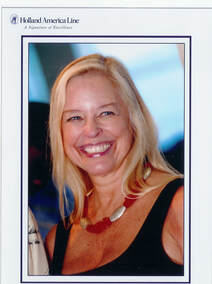 Jackie Bayless is a writer living in Laguna Niguel, CA. She has written newspaper and magazine articles for publications ranging from the Washington Post to Mission Critical Communications. Her short story, “The Red Suit,” was published in The Wall, a literary publication of Saddleback College. Short Fiction ~ Michelle Christophorou Rebecca watches her husband from across the room. He swirls and rattles the ice cubes in his Baccarat tumbler, in that way that makes him look sophisticated but — for those who know him better — suggests he is annoyed or, worse, bored. For junior associate Andrew, Rebecca surmises, it is yet another demonstration of John’s standing, that rare mix of attainment and cool. A kind of Mad Men’s Don Draper in the world of corporate law. Though, she hopes, minus the addictions and adultery. They’ve entertained them all in her oak-panelled drawing room. Senior associates lusting for kudos, straining for the privilege and the cash. Intoxicated by the long-lawned detached in Ealing, the buttoned-velvet sofas, the walls adorned — not with family portraits — but with a smattering of Bacon and Freud, and the occasional up-and-coming discovered by their dealer, now just making their names. John even invites the occasional trainee, mainly Eton boys in Savile Row suits, but once a female, glowing skin and bronze, ringleted hair. Rebecca had narrowed her eyes at that one. After their guests leave, John will sit back on one of those five-digit sofas, relax his spine and, by a half-notch, his accent. Rebecca will open the French windows, let in the late-August air, still heavy with honeysuckle, fire up the sound system. Buena Vista Social Club, Herbie Hancock, or something that will surprise him. Perhaps that new one with the rave reviews? But there are rituals to get through first. The junior partner at Rebecca’s elbow turns to her. “How long have you lived here?” Polite conversation? Genuine curiosity? Sizing up his prospects, the years it would take him to buy somewhere like this? Rebecca gives him — Jatinder? — the benefit of her doubt. “All my life. It belonged to my parents.” She doesn’t add that John moved in when he was eighteen. That they sent him to study Law to support the foetus in her adolescent womb. Alexander would have been about Jatinder’s age now. “Nice. I grew up in a two-bed terrace.” “And I’d guessed you were an Eton boy.” “Winchester scholar, actually. Sikh, working-class, with a Brummie accent. Made to feel very welcome.” “Well it certainly agreed with you. John tells me you were made up this year.” Jatinder laughs and turns out his palms in a semi-shrug. “What did your parents do?” he says. “Ask Philip Larkin.” He regards her with a wry smile. Says nothing. “Father was a surgeon. Mother lunched. Among other things.” Thirteen-years old, home from school early, muffled voices, the bedroom door slammed in her face. “Didn’t fancy medicine yourself?” Jatinder swipes two champagne glasses as the hired waitress hovers. Passes one to Rebecca. She downs the half-inch left in the glass she was holding, hands him the empty. “Do you always ask so many questions?” “How do you think I was made up?” Rebecca looks over at her husband. John is now standing, legs planted wide apart. His right elbow juts out as he addresses the small circle around him, drawing laughs of exactly the right timbre. Andrew looks up and catches her eye, glances right to note Jatinder, standing comfortably beside her. The calculation is apparent in his face. Must one court favour with the wife to be made partner by one’s early thirties? She turns back to Jatinder. “And is this what you always wanted?” “I’m not sure—" “The law? Partnership?” “I suppose.” “What might you have done instead? If money were no object.” She looks up. Andrew is halfway across the room. “Let me see. Opera singer? Circus master? Pole dancer?” I like him, thinks Rebecca, just as Andrew arrives. “Rebecca,” he says, with an almost imperceptible bow. “The house is looking marvellous. I love the painting of the lilies.” “Jatinder here was telling me what he might have been if he were not a lawyer.” Rebecca fingers the petals of a rose in the vase beside her. “Can’t say I ever considered anything else.” She wonders what John sees in this one. “But if you had to?” “I honestly don’t know. A pilot?” “Glorified bus driver,” says Rebecca. “Speaking of flying, Andrew is helping me with that German airline deal,” says Jatinder. “He’s a quick learner.” Kind too, thinks Rebecca. Like John. Kinder than me. And maybe this Andrew is simply very good at his job. Perhaps that is what John sees in him? She knows that, in some way or other, these young men he brings home are all his sons. John is heading towards the door. “Excuse me,” says Rebecca, and hands Andrew her glass. She intercepts John, feels the warmth of his hand on the small of her back. Half support, half caress. “Time?” he says. She nods. Ten minutes later, John has sent the waitress home, and negotiated his guests into the hallway. Jatinder is at the bottom of the stairs. “Come to lunch Sunday,” she hears herself say, “if you’re not too busy.” “I’d like that,” Jatinder replies. “One o’clock.” And, at that moment, he is her son, too. When Rebecca returns to the drawing room, John is on the sofa. She opens the French windows, selects Van Morrison. No, she changes her mind. Cigarettes After Sex: mood sublime, lyrics questionable. She sits on the arm of the sofa. John closes his eyes for a moment. Opens them again, looks at her, exhales imaginary smoke. “Who’s this?” “Tabs After Shags.” She grins. “What?” “Never mind.” She takes his hand, the rough squared shape of it familiar as her own, leads him to the terrace. They begin to dance. John leans into her. He smells of sandalwood, moonlight, dawn breaking after a restless night. ~  Michelle Christophorou won the Retreat West Fire-themed flash fiction competition in 2019, for which she received a 'Best of the Net' nomination. She has also won and come second in, respectively, Ad Hoc Fiction and Retreat West micro competitions, and was a runner up in Funny Pearls' short story competition. Her fiction has appeared in print and online, most recently in Splonk, Virtual Zine, Lunate and 100 Words of Solitude. In an earlier life, Michelle practised law in the City of London. Tweets @MAChristophorou Short Fiction ~ Rachel J. Fenton A Road Closed sign prevented Patricia from driving to Ruia’s house. She parked up outside the old church – the only other old building left – and walked the couple hundred yards back to the junction and down to Ruia’s house, her bag banging her left knee every other step. Ruia never answered the first knock - but after Patricia hammered the dimpled yellow glass with the side of her fist, the familiar click and drag of Ruia’s walker heralded her approach and Patricia watched her coming into view like an image in a Kaleidoscope. ‘What you got to smash the door like that for?’ For all she was slow on her feet, Ruia was quick with her tongue. ‘Don’t exaggerate.’ Patricia pulled at her tunic to get some breeze through. ‘Not for want of trying.’ Ruia adjusted her walker. ‘Well, are you coming in, or did you just come to smash my antique glass?’ ‘You should open the door sooner, you know it’s me at this time, then I wouldn’t have to worry about you.’ ‘I thought you weren’t coming.’ ‘The road was closed. When did you last leave the house?’ Patricia took a deep breath. ‘Well, my hallway isn’t closed; what are you still dawdling outside for, giving the neighbours something to gawk at?’ Patricia gave her tunic another tug as she waited for Ruia to make way and said, ‘I’ll leave this door open, let some air in?’ ‘No, I don’t want my neighbour’s cat in again.’ ‘Can I open a window then?’ ‘Does it still stink?’ ‘I’m just melting, love; it’s twenty-eight degrees today. You must be dying in that frock.’ ‘Well, I’m dying in any frock.’ Ruia laughed, pleased to have shocked. Patricia followed her into the parlour at the back of the house, where she’d set up a day bed at the last visit. ‘How are you finding it?’ ‘Bloody slow.’ Ruia rubbed at a stain on her fingernail. ‘I meant the day bed.’ ‘Oh. Well.’ She looked out the window. ‘It saves my legs but,’ her voice trailed off. Patricia looked over Ruia’s shoulder, to where a woman was hanging like a kite from a high branch on the kauri in the neighbour’s section. She had attached red ropes to the top branches. She said, ‘She fills the section.’ ‘She was there before they put up the fences.’ ‘She’ll do some damage if she comes down in a storm.’ ‘Not as much as she’ll do if they cut her; every tree in this neighbourhood will die if they kill the mother.’ Patricia wanted to point out that there were no other trees left in the neighbourhood but instead she said, ‘I’ll close these curtains for now, else we’ll give her a view of you changing your frock from her crow’s nest.’ ‘Why do I have to change?’ ‘Why do you want to be wearing winter clothing on a day like today?’ ‘It’s not winter, it’s got flowers, see?’ Ruia pointed to the print, all blue except for a bloom at the back that was changing colour the way real hydrangeas do in the wrong soil. Patricia opened her bag, put on blue latex gloves. ‘We match,’ she said. She stopped smiling when Ruia planted herself on the bed. ‘I’ve got a cotton frock in the laundry cupboard,’ Ruia said. Patricia liked looking at the photographs in the stairwell, of Ruia smiling in upside-down teacup-gowns with feather trims that gave her the appearance of a fairy missing her tree. She opened the linen cupboard. The dress was folded neatly under a teacup. Each had orange flowers, neither appeared out of place. ‘What took you so long?’ ‘Your photos. You were beautiful when you were young.’ ‘Well, it’s a wonder I haven’t died of old age waiting for you.’ Patricia laughed. ‘Let’s get you changed, eh?’ ‘I think you’ve more interest in my frock than her up that tree.’ Ruia smiled, pleased to have shocked again. Patricia was glad for the timing of the chainsaw’s din as she wiped Ruia’s skin. ‘I’m being as gentle as I can,’ she said. ‘There. Now, do you want me to make you some tea and you can have it outside while I get tidied up?’ Ruia stared at her frock, twisted a bit of the hem. The flowers seemed to close then come alive all over again. Patricia ushered her into the back garden and settled her at the rusty bistro set. ‘It’s cold,’ Ruia said. ‘It’ll warm up,’ Patricia said, looking at the tree. She could see Ruia while she filled the kettle, and beyond her, the small figure of the tree surgeon working her way through the kauri, cutting each roped section then lowering it to where another person pushed the smallest parts through a chipping machine, out of sight but for the spray of orange mulch that arced above Ruia’s head. As the machine bit each new branch, Patricia saw Ruia flinch. After she changed the bedding, she made the tea in the cup and carried it out. ‘Aren’t you having one?’ Patricia pushed the cup towards Ruia so that the handle was easy for her to reach, and said, ‘I couldn’t find your crockery. Besides, I’ve only paid for an hour’s parking.’ Ruia shrugged. ‘I’ll show you out.’ ‘You enjoy your cuppa.’ ‘I can’t enjoy anything with that racket.’ She gripped her walker and gestured towards the remains of the tree with her teacup. ‘It’ll let more light into your back.’ ‘Birds have nowhere safe to land.’ Patricia followed her. From the front door, Ruia threw Patricia an expression from one of the photographs. ‘Let me.’ Patricia manoeuvred the walker then noticed the teacup, then others either side of the path among flowers overrun with grasses. She turned in time only to see the cat run through the open doorway and the small figure in the bright frock like a piece of stained glass falling away from the frame. ~  Rachel J Fenton is a working-class writer from the north of England, now living in Aotearoa New Zealand. She won the University of Plymouth Short Fiction Competition, came second in the Dundee International Book Prize, has been shortlisted for the Strands International Flash Fiction Competition, nominated for a Pushcart Prize, and was recently nominated for the Best Small Fictions Anthology. Short Fiction ~ S. B. Borgersen He came to me at three o’clock this morning. Wanting to take me to a party. He is dressed as never before — in leathers. And for a guy of two metres tall, that is one helluva lot of forest green leather. The party is somewhere I’d never been, with people I’d never met. The music is foreign to me, but a wonky translation of Bridge Over Troubled Waters tickles a memory somewhere. The booze is all gone. And we’d taken none for the BYOB. The restaurant across the road is full of all-nighters spilled over from the party. We are turned away. The street vendors are packed up, leaving behind the ever ingering aroma of charcoal. So we give up until hey-hey along Jimmy comes in his van. “Climb in,” he says. The route home is not to home but to some place I’ve never been. We are dropped at Coalman’s Corner. I’m not sure why I’d worn pale aqua lace tulle, but it is a party dress I guess. But not anywhere near warm enough for a bleak, Lincolnshire February dawn. But as the sky turns from thistle mauve to orchid pink, I look across towards the wolds, to find the first hints of golds. I turn to him then, to share the wonder. But he is no longer there. *** Some say it was madness, others said I was bonkers. But I knew it was the right thing to do. At the time. Remember when I told you about how the bloody sod left me? At Coalman’s Corner? On that freezing February dawn? Well, that wasn’t the end of it. More like the start. You see, his friend Jimmy came back in his van, no longer psychedelic purple. “Climb in,” he said. Just like he did that night before the sun rose mauve and pink over the Wolds. I know, I know, it really was a bonkers thing to do. I knew Jimmy was reckless, impulsive and a tad crazy. But that was what I needed. After all, once you’ve been dumped at Coalman’s Corner, where else is there to go? Right? We drove all day. Stopping at roadhouses. Stopping to pee behind bushes. Stopping to try our hands at snogging someone new. Then to watch waves crash onto shores — imagining that scene from the black and white movie, From Here to Eternity. Foam spraying as high as houses. Playing with rainbows. Not one iota like the flat-ass calm of the dinge-grey Humber. The Caledonian McBrayne ferry was ready to pull out of Skye as we drove up the ramp. “You still ok with this?” Jimmy said. I swallowed hard, understanding this was a one-way trip. Madness? Bonkers? No, it was the right thing to do. I’ve been telling myself that for the past twenty-three years. ~  Internationally published, S.B. Borgersen writes, knits socks, and walks her smashing dogs on the south shore of Nova Scotia. Her favoured genres are short and micro fiction, and poetry. She has thirteen draft novellas gathering dust. A member of The Nova Scotia Writers’ Federation, Writers Abroad, and a founding member of The Liverpool Literary Society, Sue judged the Atlantic Writing Competition (Poetry) 2016 and Hysteria (Poetry) 2017. www.sueborgersen.com Short Fiction ~ Henri Colt The desperation in her voice haunted him during his rush through Saturday night traffic, and Logan’s thoughts raced as if he were driving into the scene of an old pulp movie. He had told Eve it was too late to go for a run, but she was stubborn, and a marathoner. He admired that, but he never liked the way she could be gone for hours pounding the pavement by herself. He burned red lights and illegally crossed lanes, passing dozens of vehicles in his haste. Before making a sharp turn into the old church parking lot, he was jolted by a speed bump. The area was dark except for a street lamp a hundred feet away. Eve’s half-dressed body was slouched against the decrepit shell of a Metro booth near the lot’s entrance. He pulled up in front and jumped from his car. His wife was naked from the waist down. Her light running jacket was ripped, and her sports bra had been pulled around her neck, exposing her breasts. Her head tilted limply to one side like an abandoned rag doll with rolling eyes. Her forehead was covered in blood. Please God, he prayed silently. Scrambling toward her, Logan noticed shreds of gray acrylic fabric from Eve’s running pants strewn about on the pavement. Her light green headband lay in a puddle of vomit next to her cell phone. She was barefoot, and he never saw her sneakers. When he knelt beside her, he retched, shuddering at the sight of her cracked lips and broken front teeth. Her cheeks were bruised, and her right eye was swollen. He knew the jagged laceration stretching from the corner of her mouth down to her chin would scar her forever. He hoped the punch hadn’t broken her jaw. Wiping fresh tears from her face with his shirttail, he engulfed her body in his. Eve’s face was expressionless in a sad, absent sort of way. Her body was cold and limp as if any strength she might have mustered to resist the onslaught had suddenly been drained from her. She didn’t seem to be looking at him, but rather through him, as if she were gazing emptily into the starless night. Her voice was broken and raspy. “Get me out of here,” she whispered. He wiped his fingers across her swollen eyelids and tucked a few locks of disheveled brown hair behind her ear. He tried to pull her onto her feet, but she didn’t have the strength to stand. Her neck disappeared into her shoulders from the effort, and she collapsed like melting wax onto her knees. “I’ve got you,” he said, lifting her again with both hands under her arms. She was heavier than her thin, 5-foot frame suggested, but he was able to carry her to the car. He leaned onto the hood, bracing himself as he reached down with one hand to open the door. She moaned when she crumpled into the passenger seat. A streak of blood dripped from between her still uncovered thighs, and there were bruises on her shins and small porcelain feet, as if she had been kicked and stomped upon. He reached across the headrest to pull a plaid woolen dog blanket from the back and draped it over her shoulders. Folding the blanket around her, he covered as much of Eve’s shivering, mostly naked body as he could, trembling when he wiped what was probably dried semen from her chest. A few passers-by were gathered near the parking lot. They seemed to move cautiously toward the car, but with curiosity, not to offer help. Their undulating movements in the shadows of the nearby street lamp reminded Logan of dancers in a scene from West Side Story. Suddenly, like fish swarming in expectation of a feeding frenzy, they began running toward him. “Let’s go,” Eve pleaded. He closed the car door and darted to the driver’s side so he could slide behind the wheel. When he turned the key in the ignition, his headlights blinded the crowd. Backing away from the curb, he struck an orange traffic cone that bounced onto the adjacent greenbelt. “We need to get to the hospital,” he exclaimed, putting the car into forward drive. His words bounced off the windshield and hung heavily in the claustrophobic space. “No,” she mumbled. “You’re hurt, Eve. We’re going to the hospital, and I’m calling the police.” “Just take me home. Please, just home.” He sped onto the boulevard, undecided whether to turn toward the hospital or go left to their house on Central Avenue. Eve vomited over the dashboard well before he reached the intersection. He immediately stopped the car and held her in his arms. “I’m so sorry,” he told her over and over. But his words, although ageless, felt insignificant. ~  Henri Colt is a physician-writer whose passions include mountaineering and tango. His short stories have appeared in Rock and Ice Magazine, Fiction on the Web, Active Muse, Potato Soup Journal, Adelaide Literary Magazine, and others. The alpha female made her way along the worn track by the river. In her jaws a live thing. The pack members picked up the scent and the sounds. They rushed to greet her. She stopped, dropped the creature into the hardened earth, and reminded them of her dominant rank. With her hackles bunched, her ears erect, and her lips curled back, she snarled. The young animal between her paws squalled. The pack backed off, their yips and yaps graduating to playful growls and barks. Two of the higher-ranking members, a Kerry blue and a Labradoodle, used the opportunity to fight each other for position in the pack. A huge Maremma Sheepdog, the alpha male, leaped into the savage tousle of twisting bodies, snarls, arched backs, spittle-foam, loose fur and red-raw wounds. The two subordinates flipped onto their backs, their underbellies and throats exposed. The sheepdog then shifted his attention to the live thing guarded by his mate. Through his nostrils he pulled in the sickly taste of sour milk, urine and faeces. The alpha she-dog, collected the abandoned stray in her jaws, and trotted off towards the den in which she had, weeks earlier, given birth. The den, a tunnel measuring three adult dog lengths, which led to the birthing chamber, she had excavated under a fallen tree. Inside the chamber squealed five puppies. Among them she placed the new arrival. Unlike the others, it showed no interest in suckling. But, as soon as the dam licked it clean, and it took in the heat from its new siblings, it too attached itself to a teat and suckled. Sitting up, it then made gurgling sounds, and looked properly for the first time at the she-dog and her puppies. “Wow-wow,” the he-child said, and laughed a gurgly laugh. ~ 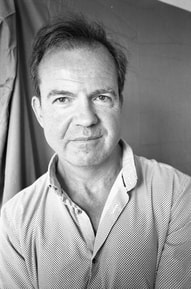 Steve Wade’s award winning short fiction has been widely published and anthologised. He has had stories shortlisted for the Francis McManus Short Story Competition and for the Hennessy Award. His stories have appeared in over fifty print publications, including Strands Publishing, Fjords, Boyne Berries, Crannog, Bridge House Publishing, New Fables, and Aesthetica Creative Works Annual. He has won First Prize in the Delvin Garradrimna Short Story Competition on four occasions. Winner of the Short Story category in the Write by the Sea writing competition 2019. He was a prize nominee for the PEN/O’Henry Award, and a prize nominee for the Pushcart Prize. www.stephenwade.ie Short Fiction ~ Neil Campbell He did six fucking people on our street, one bastarding street. Fucking hell, there’s more coming out every year. I used to go in the Grapes, my old fella played bowls round the back, crown green bowls, not flat green, and he’d be out there in all weathers playing because he loved it and his dad, my grandad, played it as well. Not sure why I never did, I think he showed me once and I just couldn’t be arsed with it. I’m not going to mention this fucker’s name that did the six on the lane, he did shedloads over the years and the police round here, well, you think they might have been better but there wasn’t really the technology in them days. I watched this programme and it said he’d done the six and it showed more footage than I’d seen before, of him being interviewed and that, and him sitting with his back to the interviewers, the arrogant bastard, and that famous footage of him on TV coming out of the back of his place to talk and deny everything, and, seeing the relatives of one of the women he did, part of me wished I’d agreed to the interview, but that was ages ago now, TV takes ages to come on, doesn’t it? It must have been like thirty years ago now, yeah, that’s right, thirty years ago since it all came out, and what they showed in this programme is that he could have probably carried on but he got well cocky and fucked up. What he used to do was go round to the old dear’s house and put the morphine in their tea, and then he’d go back, pretending to be on his rounds, and he’d find them dead and report them dead of just like old age or whatever. When it wasn’t just old age he put on the death certificates, he had to make it more convincing, and they showed that on one of the ones from the lane here, what he did, the evil bastard, he killed her and then went back to the office and changed the medical records to make it look like she was ill when she wasn’t even ill, and it was only because a computer expert at the time was able to see that he’d done this that they were able to build up the evidence against him. And he’d changed her will, so she left all her money to him, which was a bit of a piss-take really. I have memories, like my memories of my old man, playing crown green bowls. He was out there nearly every day after me mum had gone, but when they dug her up and found there was still the traces of morphine in her it seemed to just take the spirit right out of him. I can remember when he stopped and why he stopped and he lost all the mates he used to bowl with and he never got any exercise any more, he just used to sit there day in and day out watching TV, he loved TV my Dad, it was sort of invented when he was a kid and it always seemed amazing to him and he had all these programmes recorded on the Sky box and he never got round to watching them all. That’s where I found him, sat in the fucking armchair in front of the TV like he’d just fucking given up, couldn’t be arsed anymore. I’d wanted him to be angry but he said he couldn’t get angry and he was a gentle old soul and all he could ever do was beat himself up about the fact that he had defended the evil bastard, he’d said to everyone around that it couldn’t be possible, it couldn’t be true, and he felt fucking stupid, you were supposed to protect your wife weren’t you? That’s what he said to me once in a whisper, and he had this kind old face, breaks your heart to think about it and me mum, well, me mum, I’ve not really said anything about her yet and yet she was the one got bumped off, one of probably hundreds they reckon, and she was the only person in my life who never let me down, even more so than my old man, she was just on my side at all times, whatever I’d done, and I’m no shrinking violet, let me tell you, I never was and then when I found out about her it sent me over the edge a bit you know, I got horrible after too many beers and I was always wanting to fight someone and it was the police I fucking hated then. By now I know that the police did make mistakes but there were others that did a good job, the ones that got him were fucking well dedicated, but like I say I was looking for someone to blame and there was this one time that I was roaming round the boozers on a Friday night and this copper came up to me and said I needed to settle down a bit and I took a swing at him didn’t I, didn’t really connect but before you knew it there were four of them on me, and I spent a night in the cells at the same cop shop where the evil bastard got interviewed and when I told them about me mum and that, they pretty much let me off. They still had to go through the paperwork and that but their whole attitude changed, they just started being nice to me and one of them even gave me a lift home. There’s nothing you can do. The evil bastard was found guilty and he topped himself without ever admitting anything. That poor bastard, if only I could go up to him and kiss his face. ~ 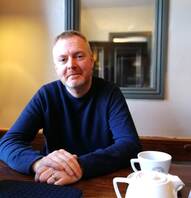 Neil Campbell is from Manchester, England and his latest novel Lanyards, the third part of a Manchester trilogy, is out now. ncampbellwriter.wixsite.com Short Fiction ~ Patrick Douglas Legay Any mindful rider could sense it coming. The animal stiffens, slows gait, maybe shudders a little. Makes that breathy grunt. Every horse has his or her own little tell, and often a different one for pissing. One after the other the horsemen yanked their reigns toward my lane, clopping over the tracks to drop dung. The rest of the thoroughfare was otherwise clear. Sometimes I'd have to stamp both feet onto the brake to come short while some nag was lifting tail to let go. Once they trotted out of the way, some pile of shit left behind, not like I can change lanes. Just gotta plow right through it, smashing that stink up into the air. The passengers all holding their noses, saying, "Pee-yuu." Except those kids, those rowdy devils. Upon any sudden halt, they'd swear foul curses and get all shoving each other, knocking each other's caps off, laughing, falling into the working people, and swearing even louder. One time it went too far. Punches thrown, one kid choked the other until he got out of it, and that kid pulled a knife. I saw the glint in my mirror, so I stamped the brakes again, squealing and scraping on the rails. Lucky the kid didn't stab himself. And when we came to a stop, everything settled. I looked at him in the mirror and belted, "Look, you goddamned little devil, if you gonna kill someone, don't make it some poor dumb kid. Kill someone who deserves it. Ask Leron there." I pointed my thumb back at him. He was sitting in his spot on the bench in the middle. Musta been one of them Widely Observed Postal Holidays, because Leron rode the trolley right from first light, then pretty much all that day. He'd get off for a spell, then wouldn’t ya know, there he'd be on the way back, running, stumbling to cross the bricks in time. Leron looked puzzled, pointed at his own chest, and mouthed, "Me?" "Yeah, Leron, weren't it just this morning you was telling me about someone in particular? Someone who don't deserve to live?" "Hoh yah," said Leron. He stood up, turned to them kids carefully, and spoke slow, slurring, "Tha man ehs evil." "Sit back down and tell them," I said as I got the trolley rolling again. He crashed himself down, and set to telling them as best he could. Still his tongue kept pasting the words together. Them kids all sat too, polite, listening, their dirty faces baring smiling teeth. They were dealing with him like he was a dimwit, but he wasn't. Leron was a letter carrier, and on his days off he drank and drank and went around letting loose about all of the dark and sordid details he learned about the people whose postboxes he frequented. Things he put together just by showing up, keeping an ear out, delivering their letters every day. He slurred it out to those fiendish kids, repeating when they asked, everything he pieced together about some foreman. One who was the sort of man what put all his frustrations into his wife. And how he did beat her so bad, his pregnant wife. She miscarried and almost died, almost bled out, had Leron not gone next door and rang for the hospital carriage. Same story he told me that morning. "That Mikey O'Keefe's mother?" asked one kid, shrieking it from the back. "Yesh, I guesh," said Leron. She had been crying for days, screaming murder, Leron explained with repetitions. "Yeah, Mikey," said one of them. "They say he ran away." "Doobel murder," said Leron, chuckling in a strange, choking way, sobbing and laughing at the same time. And those kids laughed too, with their eyes flashing. Like it was both the most angering and most enjoyable thing they ever heard in all their young lives. Leron tilted a little glass flask up to his mouth. It glowed in his palm until he swallowed and licked his lips, acting like he was hiding it well. "You know the stop?" asked the kid with the knife. He thought it through, and when he answered, Leron said it all hushed and only to them. They nodded, clapped and slapped their knees. When I slowed and called out the stop, they were up and around him, steering him off, out to the bricks, where they propped him up so he could point the way, which he did, holding his finger out, head and shoulders above them as they went. And they all got smaller and smaller in my mirrors. ~ Patrick Douglas Legay's writing has appeared in Adelaide Literary Magazine, Apeiron Review, and Dance Macabre. During weekdays, and some evenings and weekends, he works for a non-profit community dispute resolution center, trying to help people resolve conflicts on their own terms. Facing Forward Lying with the unforgiving press of the night, knowing the wear of the years and the slowing of my funfair ride, I reflect on the road, indeed the many roads, not taken, regret the good friends lazily unmoored, remember the lovers failed, wistfully wonder whether they are ever startled at a glimpse of a closeted memory that nevertheless still reflexes a smile, perhaps brief, possibly secretive, at some sunlit moment we once shared, and as the black faintly greys, await the morning with some apprehension but know that I will rise at the call, for each day is still a future to be faced. ~ Grief Parting From my mind despairing, adrift on a shoreless sea, achingly alone, always alone, my deadened life so, so snail slowly seeking the seed of resurrection, began to dream of rising from darkness, dared to glimpse a life with a recovering memory, faintly felt the unfear of hope, and my grief-chilled heart was soothingly warmed by the soul's tears and Love, humanity divine, bravely opened its long maskéd face, turned creakingly to shadows of memories of a life that thought it was forever past, and tenderly drew its loss close within that fearfully warming space. ~ Joy In The Time Of Pandemic I remember Mother's face when finally the steel needle on the hard shellac stopped its savage hissing and the contralto sang out to the southerly wind to bring her true love home, and the sad joy of news of a distant family birth brought by a handwritten letter eased from an envelope creased by its long travels by rail and sea, photograph to follow. News of my granddaughter's birth far away came via an electronic beep, and there she lay, safe and well in her Mother's arms, just born, and I loved her instantly. And now I can see her daily and listen to her small wordless voice, and I ache that I cannot gather either of them up in my arms but through my tears I laugh at the wonder of it all. ~ Little Things While your Mother slept her exhausted sleep, I drew you close during that long first tired night, stealthily pacing the bare creaking floor above, impotently stepping a shushing shadowed path while you cried and greatly cried a heart-tearing distress. And the night wept during those darkly drawn hours, wailing upon the glass, its tears flowing freely like a lover keening a loved life lost, and across the ceiling the wetted glass slivered a watery light leaking from a streetlight below, until with the first stealthy smear stealing into the sky my little finger brushed your fraught lips, and greedily you snatched it in, and the silence was suddenly solid as you sucked, and soothingly sucked, and I smiled a smile I still feel for it arced a golden bond that secured my love through many toilsome years. ~ 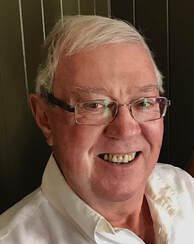 Anthony Wade, an active member of the local writers’ group, published a first poem in 2018 and since in several magazines, both print and online, including Lakeview and Strands Lit. He was overjoyed to receive a Highly Commended in the Francis Ledwidge Poetry Award 2018 for it was on finally coming Home to live in Ireland that he discovered the poems of Francis Ledwidge and they awoke in him a voice to join his ear and eye for poetry. He now lives by the sea in East Cork. A New Beginning Loneliness stalked me: Jabbering, finger-pointing; hoping I’d release My last set of wings. It took the shape of sandpaper, smashed candles; Became the pages of books Erased, scratched out − molded From the dampness of an empty house. So many mornings I’d wake in its shoes, worn thin From retraced steps; watch the same mirror Cringe as I drew near. But you returned: our voices Steadied, paralleled; a daisy surged Through a crack in the asphalt. The breadth of our memories no longer wounds us. We’ve filled a jar with water; tossed a line From prow to pier; ignited Our shadows. ~ Full Circle Once, like you, I was a drawer jammed shut. And I contained a moon, an ocean, a blossoming cherry tree… But when I began to dream, my hopes freed me. ~ Messages Hands that burst through the walls clutch messages. One reads: Tear your life from its hinges. Your hopes have become playing cards held in vain. Another: Don’t empty a drawer that took so long to fill; your life is a vase admired more than the flowers it holds. Remember the years packed away; ignored. Your future is a table that can finally be set. Another: Death laughs when he hears your name. He’s amused at the way you try to balance so much upon your tongue – He’s waiting for the day it all comes crashing down. He knows you’ll make a good rung for his broken ladder. ~  Joseph Murphy has been published in a wide range of print and online journals, including The Ann Arbor Review, Northwind and The Pangolin Review. He is the author of four poetry collections, The Shaman Speaks, Shoreline of the Heart, Having Lived and Crafting Wings. Murphy is also a member of the Colorado Authors’ League and for eight years (2010–18) was poetry editor for an online literary publication, Halfway Down the Stairs. Short Fiction ~ Patrick Williamson The world I inhabit seems limited to a set pattern of paths and roads. Going to the bus stop, coming back, the supermarket and back, making a beeline for a pub and staggering carefully home. It takes effort to go further than the edge of the known world. It makes me tired. I begin to ask myself questions like why, and what's the point, and I don't really belong here do I? Then I become lost in the immensity of it all. We live in one of these Georgian terraced streets that personify the city, in a house at the end, between two being done up. Where builders have taken over the front garden, filled it with dust and chaos. And when I say we I don't mean her & I; I mean the two of us. Not my wife, let me rule that one out straight away, I've never married, never will. Too late for that now you might say. I'm someone people remark on, poor old… what must have happened to him when he was young, etc. No, I mean the downstairs neighbour and myself. My neighbour I'll call him, to preserve anonymity. Tenants are usually just that, occupants. My neighbour has a front tooth missing, the others cracked and nicotine stained. Not prepossessing. Thinning hair and usually two to three days growth. A designer beard you might say. His front room is sparsely furnished, with badly varnished brown thirties furniture, a threadbare carpet, dank shelving along the sidewall. A perpetual gloom hides the corners, the damp wallpaper, the tiled kitchen entrance. We would play chess, in the afternoon mainly, to while away the time in winter, and keep thoughts from straying. As we played, we could feel the wind and the rain outside and this would make us feel cosy. The twilight would permeate our concentration and consciousness of the outside world we had stifled. Finally, he would get up, switch on the yellowing lamp that brought out the decrepit walls and draw the curtains over leaves brushing street lamps, their light casting shadows on the paving. We would stretch. He would get some tea, clanking in the kitchen. * I thought she was. She wore a white mackintosh and a small low-slung handbag and might have been respectable if it wasn't for a pale drained face and cropped hair. My head turned as she passed because, whisky or not, she looked familiar. I saw her negotiate crossing the road. Caught on the centre line — the lights changed too fast — then straight to a 24hr minicab office, she poked her head round the door. I watched her, thinking it unusual. She waited outside. Shortly, a tall black man came out & she followed him round the corner of the office, out of sight. I retraced my steps. A taxicab was parked in the shadows, they moved off & she sat in the back. Night, and the cars I watched moving down the wide city street all became taxicabs with fares. I swerved towards my destination. Sunk into my drink, I began to forget. Full of whiskies, I started to walk home, and she passed again, caught my eye. She couldn't have been a customer then, I thought. I hadn't seen her that long ago and if she were taking a taxi home she wouldn't be passing now. I thought this was logical. She walked faster than I did, briskly, paying no attention to the night-time streets. She wasn't looking for business and didn't attract any, no cars slowed down. Drawing away from me fumbling with thoughts such as these, she merged into the neon. Then she vanished, twisting down a residential side street. * When her body was found at the bottom of our garden, conjecture about her life, or anything really, became immaterial. I was out at the time, gone up the high street, stopped off in a strange pub until closing, and when I came back I found a crowd of onlookers outside the house plus police cars, marked, and unmarked. It sounds corny to say it happened like that, like in the films, but then it did and I didn't really believe it was our house they were interested in, and walked on up to the front door. Then a policeman stopped me and I had to say I lived there and ask what all the fuss was about. The policeman who interviewed me was quite ordinary, asked all the normal questions. The normal ones I suppose. If you haven't been in a situation like this before, you've only got the TV to go on. My movements, if I had seen anything out of the ordinary, details about how long I had been living there, age, profession, etc. Information I don't normally like to give out. Don't like being asked too many questions. He didn't give me much in the way of answers either. Just routine verification of occupants, first line of gathering. I felt quite detached, though his eyes flickered from time to time. Maybe it was the drink, maybe the blue flashing lights, maybe the sobering hand of crime and authority. She had been strangled. The newspapers said, and the police said, later. Dumped in the brambles by the wall backing onto the alley. It's quite a high wall, so she must have been rolled over. Taken a strong, or desperate, man to do that, or two men, but this, they say, has been discounted. This was sometime after the sighting at the minicab office. We had almost bumped into each other (I had my collar turned up, against the November wind), but just in the nick of time we avoided contact. The way pedestrians in a crowded street, moving fast, always manage to. It was almost too, as, turning round to watch her retreating back, I thought about catching her up and asking what she did. I was curious you see. * Do you think I'm exaggerating things, or imagining, or exaggerating what I imagined then? No, you must be mistaken. I’m not the kind of man to be fanciful, I must be a man mustn’t I. The whiskies and all that and the interest. Well, you’re right, I am a man. That explains many things doesn’t it. That's why the ideas kept coming back, lives in the small hours. The darkness makes you feel strong, with only the radio voices of the world for company. * My neighbour saw me from the doorway, but didn't move. He saw me bend her over the sink and was afraid because I was so, because it was so, powerful, I think. The desire to see. Then he was afraid because he had done nothing and there was no excuse. No way to undo duty to rescue, I think you call it. Collusion. Everybody's at it. I don’t see why he should think himself any different. You know how it is when you're never satisfied with the answers you've been given. I had lured her. You want to take them by the throat and, what else? The impulse is dealt with, and all that remains is. We did not speak much. Lifted her body out from the corner by the kitchen cabinets, off the floor. Automatically moved the body onto the sofa, face turned away (as if she'd had too much to drink, as if she was sleeping it off), sunken into armchairs, facing the floor. We tasted the coldness of the tea. So where are the answers to your questions, and what questions did I ask but not be patient enough to hear? * * The small hours when bodies slip out unseen & slip into darkness. I looked up at my neighbour, then at the bare bulb, and wondered which one looked yellow and which one grey. In the shadows, a sense of urgency but no will. I kicked him on his foot to jolt him out of his stupor and went to search for a piece of cloth to cover her face. Temporary like, no point giving away what you don't have to. Anyway, what was she going to do with it. That was for us not her, not for the police either. But they'd certainly have a use for it. I found something in the kitchen, placed it over her face to stop her staring. But it didn’t stop it, not really. I didn’t see anything then. Only later. Only when we were back inside. Lifting her onto our shoulders we moved on out, treading the dirt into the hall carpet, peering left and right into the sombre street. Just like good children do before they cross the road, the green cross code. Swiftly, we turned in to the safety of the alleyway leading to the back. Away from any windows lonely insomniacs might be standing at. We did not plan. You don't. We hadn't planned from the start. It just seemed simple. Keep movement to a minimum. There was just a slight crush of bushes, and we held our breath, crept away. Somewhere, a dog barked. * * A high-pitched sound. I was already awake. Had been by six, curtains drawn, sat at my desk. The coldness, stillness, the shutting out. This didn't fit. Couldn't think. I couldn't tell you and if I could, I wouldn't. Through a corner of curtain pulled aside I saw her advancing inexorably up the garden. She would get there by coffee time; the undergrowth was thick but not too much for her stripper. Time. That's all that's left, watch. Another occupant cutting down, clearing. Only she would start on it. The phone. I didn't hear any more buzzing, only her Portuguese fog horning up through her window. The front door slammed. I reached for the whisky bottle & slept, the grey light cracking my ropey orange curtain. ~  Patrick Williamson : English writer and translator. Editor and translator of The Parley Tree, Poets from French-speaking Africa and the Arab World (Arc Publications) and translator of Tahar Bekri, Guido Cupani and Erri de Luca. Most recent poetry collection is Traversi (English-Italian, Samuele Editore, 2018). He is also active in music, filmpoems (Afterwords, with Mauro Coceano) and other multimedia projects, often in association with Transignum in France. Founding member of transnational literary agency Linguafranca. Short Fiction ~ Alfredo Salvatore Arcilesi After seven days of intolerable confinement, Izzy decided that this foggy afternoon was the right time to free herself. And, if she could manage, Clara. She had been testing her crippled body since the morning darkness, inundating her extremities with signals to flex, and, with any hard-earned luck, move. Her weak arms appeared up to the task; she guessed her weight to be just shy of one-hundred pounds. Her legs, however, remained stubborn, anchoring her to the bed. For all the training she had subscribed to these counterparts, none was more rigorous, more vital than her breathing regimen. Izzy's relationship with oxygen had always been of a toxic nature. A university athlete who had relied upon her immaculate lungs for victory, it had been an unreliable ankle that decided ten metres from an important finish line was the time to snap, end her career, sink her into the depths of depression, and enrol her in a new, lifelong sport: smoking. Three packs a day, four when she was feeling particularly good (or bad), for fifty years. And now the ghosts of cigarettes past were preventing her, in spite of her cooperative arms, from liberating herself, and, more importantly, Clara. Izzy exhaled a laboured breath, painfully inhaled another. She should have been accustomed to it by now, but the air filtering throughout her sanctuary still tasted as artificial as it smelled. She felt the rather stale intake race through her mouth and nostrils, hoping to reach the pair of black bags that kept her going for no real purpose. Save for Clara. The clean dose of oxygen reached her ashen lungs, then exited her mouth and nose in another laboured exhalation. Izzy imagined the polluted molecules warning the new wave of respiration about what corruption lay within her. She looked to her right, locked eyes with the never-blinking Clara, and, with a look that said “Don't you dare move now”—she couldn't risk precious breaths on her roommate's deaf ears—began the arduous journey. Izzy watched as she willed her right arm across the centimetres that felt like kilometres of bed. The feeble limb made pitiful progress before stopping entirely so she may regain what energy she could. A surge of anger propelled her arm against the plastic sheet dividing her and Clara. Her hand slid down the thick material until it landed in the crevice between the sheet and edge of the bed. Using this newfound leverage, Izzy began pulling her weight with her right arm, while pushing against the mattress with her left. The juicy idea of giving up had crossed her mind, just as it had when her former severely fit self, besieged by physical and psychological cramps, had desired to slow her run to a crawl at the three-thousand-metre mark. Her conditioned lungs had burned then. Now they were volcanic. But the agony and certain death would be worth it. Not only for herself, but Clara, who had never felt a pang in her endless life. Izzy now found herself at a ninety-degree angle: the top half of her body sprawled laterally across the bed; the bottom half remained affixed to where it had been since she embarked upon this suicide mission of sorts. After a quick mental team huddle with her barely-working parts, she used her right hand to push against the plastic sheet. The damn thing was like a wall of concrete. Her reluctant body threatened to pull the plug on the whole operation, but a little bit of that wholesome anger, and a lot of thinking about what would happen to Clara if she failed, helped free the bottom of the plastic sheet from between the mattresses. Izzy exhaled so deeply, the fog outside of her only window found its way to her eyes. One breath. Her vision slowly... Two breaths. ...slowly... Three breaths. ...returned. She felt her old nemesis oxygen assisting her rushing blood to restore her vision. But she knew better; death had brushed past her. Move it, she urged herself. Izzy hadn't intended to escape by falling on her head, but as she shimmied herself closer... closer... closer, then over... over... over the edge of the bed, it seemed the only way. Her head free of the plastic sheet, the faint aroma of cooking bombarded her olfactory. She couldn't help but sacrifice a valuable breath to take in the recipe she had shared with her daughter long ago. You're using too much garlic powder, she thought, the seasoning burning her sinuses. But that was Isabelle: too much or too little of everything. Her shoulders hanging over the edge of the bed, thinned blood rushing to her head, Izzy wondered—not for the first time—what Isabelle would think when the time came to trudge upstairs, check on her dying mother, and find her however she ended up. Hopefully, with Clara in my arms, she thought. She wondered if her daughter would even care. The pair of Izzy’s had lived a life of few kisses and plenty of bites. Izzy had made the cliche attempts to live via her namesake (Isabelle's ankles were still intact, after all). Her daughter had indeed run; not on the track, but away from home, turning the typical one-off act of rebellion into a quarterly sport. When she was home, Isabelle would blame Izzy for all of her life's unwanted biographic details: the casting out of her father, the selfish act of naming her after herself (never mind the tradition), the reason for her isolating unattractiveness, the asthma and other varieties of respiratory ailments courtesy of her chain-smoking. That her only child had decided to punish her by never marrying, never having children, was not lost on Izzy. Still, when Izzy had become too ill to breathe on her own, it was Isabelle who rushed her to the hospital; and it was Isabelle who brought her home, tucked her into bed, and made sure the oxygen tent kept her alive. But after seven days of intolerable confinement, seven days of embarrassing baths and changes, seven days of no words exchanged save for begrudged greetings and farewells, Izzy had decided that this foggy afternoon was the right time to free herself. And, if she could manage, Clara. Beloved Clara. She could no longer see her only friend, but knew she was right where she had left her. I'm coming, she thought, hoping the suffocating air out here wouldn't render her a liar. Like in the old days, when slower competitors somehow cruised past her, good old-fashioned anger fuelled her cause, and she writhed her dangling body further over the edge of the bed like a fish out of water. A fish that wants out of her damn bowl! she goaded herself, and grew angrier at her handicap. The fingertips on her right hand touched something cold, hard. It took her a moment to realize she had touched the floor. Her left hand, still pushing against the bunched-up comforter, worked alone to send her over the rest of the way. In the space of seconds, Izzy saw the ceiling, then her abdomen, then her legs, the latter two crashing down on her. Within the same seconds, she had felt emptiness beneath her, then the same cold, hard floor forcing itself into her neck and spine. Precious breaths were knocked out of her, and the fog returned, this time most certainly accompanied by death. It took her a few moments to realize that death smelled an awful lot like garlic. A few more moments, and Izzy understood she hadn't died... and that her daughter wouldn't have heard a thing if she had. She remained alone. On the floor. Alive. For now. Alive enough to save Clara. Slowly, surely, Izzy wriggled away from the bed until her dumb legs hit the floor. Still, her daughter remained downstairs, oblivious, or willfully so. But in case obliviousness turned to awareness, Izzy needed to move as quickly as her lame body would allow at this late stage in the race. Last one-hundred metres, she implored. Since sitting herself up was impossible, she needed to figure out how to get Clara to come down to her level. Could've just grabbed her, and brought her into the tent, she scolded herself, save yourself this stupidity. But she knew it wouldn't have been fair to Clara, to have her lifelong companion go from breathing one brand of plastic air to another. No. She wanted Clara's first breath to be one-hundred-percent, certifiable oxygen... even if it was tinged with garlic. Izzy flexed the fingers on her left hand, expecting to feel a break, akin to that long-ago ankle, that would prevent her from crossing this finish line. Everything felt in working order. Hand shaped like a spider, the fingers crawled along the floor until they found the nightstand's feet. They climbed past the bottom drawer, then the middle, then- She stopped, having reached as high as she could go. She looked at the progress her hand had made, and was angered and disappointed to see the tips of her fingers so close to the top. So close to Clara. No longer able to uphold itself, her arm fell to the floor for her daughter not to hear. Her shallow, disparate breathing became shallower, more disparate. The retinal fog grew thicker. And she was certain the last time she would see Clara was in the memories she had very limited time to relive: Sneaking into her late mother's bedroom—this very same bedroom—to sneak a peek at Clara, high on her shelf. Receiving Clara on the eve of her mother's passing—in this very same bedroom—on the condition that she pass Clara on to her daughter, should she have one, when her own end was near. Asking Isabelle to take Clara off the shelf, and sit her on the nightstand; the plan to release Clara had been confirmed, all the more so by her daughter's routine sneer and remark: “Ugly thing.” Even had Isabelle loved Clara as much as she had, Izzy felt it her duty to finally free her. Come on, you useless cigarette-holder. Last fifty metres. Her nicotine-stained spider-hand rediscovered the nightstand's feet, and, once more, began its ascent. Past the bottom drawer. Forty metres. Past the middle drawer. Thirty metres. Past the bottom of the top drawer. Twenty metres. Finding the top drawer's knob... Ten metres. ...where it hung... Come on. ...unwilling to move. COME ON! Her hand sprang back, the drawer with it. Sliding. Sliding. Sliding. Until the heavy piece abruptly stopped, having reached its limit. The nightstand leaned slightly forward, and Izzy glimpsed her legacy as the dead meat filling of a floor-and-nightstand sandwich. But the nightstand had other plans; before it settled back into place, it made sure to shake free the tall, glossy box. The impact was painful, a sharp corner hitting her perfectly in the eye, but nothing compared to the torture her lungs were putting her through. Instead of fog, there was rain. Izzy blinked the burning tears away, bringing not the nightstand into focus, but a face. And what a beautiful face it was. Skin made of meringue. A faint smile on pink lips barely formed. Rosy cheeks forever pinched into dimples. Black eyebrows arching over a pair of unblinking bejewelled eyes. Had they seen Izzy? All the Izzy's? From Grandma Izzy to this sorry-excuse-for-an-Izzy? They stared at each other for some time, Izzy refusing to blink, like her little friend, lest she slip into death during one of those slivers of blackness. The smell of garlic was fading. She couldn't tell if her daughter was altering the recipe in some way, or if her senses were gradually shutting down. Last ten metres, she thought. Perhaps her final thought. Izzy used the left hand that made this final reunion possible to locate the pristine cardboard flap above Clara's head. Not with anger, but love, Izzy tore open the lid that had sealed the doll in her prison for three generations, and watched as Clara took in her first-ever breath of fresh air. ~ 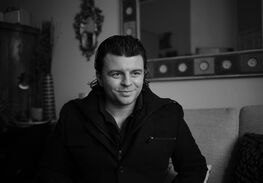 Alfredo Salvatore Arcilesi has spent a decade penning award-winning short- and feature-length screenplays, while working as a full-time artisan baker. His prose work explores the trials and tribulations of ordinary people, slice-of-life examinations anchored in real and surreal settings. His short stories have appeared in over twenty literary journals, including Raconteur Literary Magazine, Scrittura Magazine, and The Helix Magazine. In addition to several short pieces, he is currently working on his debut novel. Poetry ~ Bob Beagrie And For The Time Being Until some other arrangement is made the old Gods of the boondocks shamble around the centre of our towns and cities having crawled out of the ditches and the drains, slithered from the Edgelands far off the beaten tracks, from the suppressed chambers of our cavernous hearts, to occupy our boulevards and avenues, loiter on the public benches, in the parks behind locked gates, where we are no longer welcome. In the meantime the Community Wardens and patrolling Police can’t see these eldritch beings, their eyes are tuned to those they suspect of flouting the rules of The Lockdown, fleshy miscreants who put us all at risk, who dismiss the motto ‘We’re all in this together’ as something only our glorious leaders spout to carpet over the fact we’re not. The Community Wardens are zealous in their sweep and scour of the streets for anything non-indispensable while the old Gods run amok around them, cutting us down to size. And for the time being the doors to the places of worship are bolted, home to stained glass pools and dust motes and yet the cemeteries remain open, so we may commune with the dead, stroll between the interred bones, picture our own names on their stones, catch a glimpse of Grimnir dangling from an ash tree, Cernunnos lurking in holly thickets, Bridhid’s bright hair in the flame trees, Hel in the pungency of freshly dug soil. And for now, all the faceless mannequins in all the empty shop windows are the only ones who have watched their return. But I’m sure I’m not alone, among the living, in perceiving them during our restricted excursions, between broadcasts of Loose Woman, the One Show and the next awkward Ministerial Update. ~ Two Meters The safety zone contains five straggly weeds Seven cigarette butts in a drift of dandelion fluff Your squat fidgeting shadow on its phone The lilt of speech in a language I've never learned A pale splodge of dried chewing gum Pulsating unease and a polite smile returned Nostalgia for the way we used to live, not so long ago Air that's noticeably cleaner to breathe The chirp, tweet and whistle of small concealed birds Suspect droplets of moisture, musings on the weather A passing police officer’s measuring stare Suspicions of flouting the rules of the lock-down Worries around loved ones and the lack of an income Possibilities for a different kind of future ~ Castaways One month in and there’s a slow normalisation to the ghost lives we lead, to the sudden drops into unexpected pockets of nothingness while Spring unfolds and spreads her arms wide scattering new colours all over the place. It’s like we are living behind a veil, the world in its full complexity is there but we can’t connect to it, like we’ve been emptied out and our pasts are just tall tales we liked to weave into patterns to impress or beguile, but now we’re lacking an audience. Future tense phrases of: I’m going to…, shall we make a plan… and why don’t we… drift like pink blossom across thinned out pavements, and the present is a precarious ice bridge over a crevasse. I wake surprised to find you still here after troubled dreams of wandering the beaches of Más a Tierra and hiding away from undead pirates, but like Crusoe it’s necessary to chart the territories of our new lives, establish routines and look for footprints in the sand. There is a calmness to be found in letting some things float away on the tide. The passage of weeks is marked by the ritual of communal clapping. Yet there are moments when you’re sleeping through recovery when I think I’m only imagining you’ve come back, and my sense of reality has melted like candle wax. All the while we try to sieve out the lies and deflections, wade through the deceptive stream of war metaphors, weigh-up whatever morsels of truth we can find and lay them out on the rocks to dry, to sustain us until the worst is over. Some say that this isn’t the time for questions, yet the number of fatalities rise and vulnerable heroes move among us, a skeleton crew on our beautiful shipwreck. The horizon line remains flat and featureless, and when a ship does eventually appear there’s a nagging suspicion it could be a Man-O-War or a Slaver. ~  Bob Beagrie has published numerous collections of poetry and several pamphlets, most recently And Then We Saw The daughter of the Minotaur (The Black Light Engine Press 2020), Civil Insolencies (Smokestack 2019), Remnants written with Jane Burn (Knives, Forks & Spoons Press (2019), This Game of Strangers – written with Jane Burn (Wyrd Harvest Press 2017), Leasungspell (Smokestack 2016). His work has appeared in numerous anthologies and magazines and has been translated into Finnish, Urdu, Swedish, Dutch, Spanish, Estonian and Karelian. He lives in Middlesbrough and is a senior lecturer in creative writing at Teesside University. Poetry ~ Shanta Acharya MEDITATION Stopping to search for life’s reason, meaning, the foundation of my prayers, a daily thanksgiving – I mourn the dead who depart without a farewell, none to hold their hand, a vigil or funeral. Dwelling in possibility, I stay home alone to save lives. Every day the death toll keeps rising. Thinking of those who have no home, no income, no food, no water, I am unable to sleep – the hours weep, counting the cost of survival, of what will suffice to make life bearable. There will always be a loss to our values, of who we are unless we mend our reckless ways. A deadly virus holds a mirror up to society, revealing the extent of our inhumanity. In lockdown nature recovers, humans struggle – our lives, in their reincarnations, unrecognisable. Living in strange times where the freedom to be human has to be earned liked anything else – the nothingness shines through, clear as daylight, the every thingness fades like a dream. ~ WOKENESS Lying awake all night examining this life, an hour glass on the run, is no cure for jet-lag. Tossing and turning, an annual homecoming with street dogs howling, cats yowling, the bellow of an insomniac bull, bone chilling. A young female’s piercing cry shatters me. In the land of my birth a woman is raped every fifteen minutes, the newspapers say. Shouldering the pain and suffering of the world, night loses track of time, lays bare the frailty of our times. Is this what we were born for? Decades seem like yesterday – memory of father dying, disappearing in a pyre of flames. Never told him how much he meant to me, the continent of my loss keeps growing. A car dodging potholes, horns blaring, jump-starts me – disorienting as a plethora of roosters cock-a-doodling-doo night and day without warning. Accustomed to the muezzin’s call to prayer after the ecstatic dawn chorus bringing blessings of sleep, this year’s silence usurps my peace. I wait all day for the salawāt to begin. ~ FLIGHT DISTANCE (With acknowledgment to Yann Martel’s Life of Pi) Flamingos in the wild won’t mind our presence three hundred yards off. Cross that boundary and they sense danger. Get closer, and you trigger a flight reaction from which they will not cease until that safe distance is re-established or their lungs and hearts fail. Giraffes will allow you to come within thirty yards of them if you are in a vehicle, but will retreat rapidly if you come within a hundred and fifty yards on foot. Fiddler crabs scurry if you are ten yards away. Howler monkeys stir in their branches at twenty. African buffaloes react at seventy-five. Cats look, deer listen, bears smell. Male seahorses flee, flashing a light of amber – How far or near to you am I allowed to venture? ~ Shanta Acharya, Imagine: New and Selected Poems (HarperCollins, India; 2017) PARALLEL LIVES Life bears no resemblance to what it might have been, you simply play a part, an actor on screen, discover your ideal life exists in a parallel universe, lived by some stranger with whom you can no longer converse. What sacrifices are you willing to make to live in your dream? You offer blood, sweat, tears, the best of yourself, yet they seem not quite enough to swap one illusion with another. If lucky you forget your dream, learn to live your life that bears no resemblance to what it might have been, you simply play a part, an actor on screen. ~ Shanta Acharya, What Survives Is The Singing (Indigo Dreams Publishing, UK; 2020)  Shanta Acharya is the author of twelve books, her latest publications are What Survives Is the Singing (Indigo Dreams Publishing, UK; 2020) and Imagine: New and Selected Poems (HarperCollins Publishers, India; 2017). www.shantaacharya.com Poetry ~ Alisa Velaj STILL... Still sleepless that sleepy soul in the morning That lily that is as sweet as honey That has spent all night long spying on stars All night long He will sleep He will sleep upon the fall of dusk The birds and the morning light sing in one voice I too will sleep on his Madonna horizon Where the ocean’s mysteries flee in shelter… English translation by Ukë Zenel Buçpapaj ~ A SONG The swan lowers her neck To touch the waters, And translates into brightness… The dawn snatches the song From the bird’s throat, And translates into Night! English translation by Ukë Zenel Buçpapaj ~ 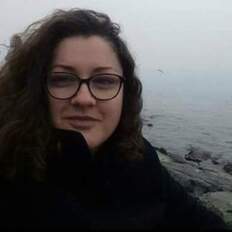 Alisa Velaj was born in Albania, in 1982. She holds a Ph.D. in Albanian Language and Literature, which subjects she has been teaching at the university level while writing poetry, prose, essays, articles, and research studies. Velaj was shortlisted for the Erbacce-Press Poetry Award in 2014. Her poems have so far been translated into English, Portuguese, Romanian, Turkish, and Swedish, as well as published in over a hundred international literary magazines. Her poetry collection, With No Sweat At All, will be published this year by Cervana Barva Press (USA), while Dreams was recently published by Cyberwit Press (India). Both collections are masterfully translated into English by Ukë Zenel Buçpapaj. Poetry ~ Roberto García de Mesa translated from Spanish by Lee Lee Moss Country You fixate the golden glow of a tumbler in a gin shack. You allow it to happen. The spotlights shake you and you collapse on the table of glass. You are sufficient less, but you reach the level of excellence. You let yourself be loved by the silent revolution and a place in between the shadows. You arrive through the back door, you pilot through the labyrinth and the distance between you and you is bearable. At least, for a few seconds. Before saying what you think and entitled in the academy of the forgotten. And it is that you belong to a damned country in a magical place. Rebel tied to a color, a color among millions of stars, a recognizable color that masturbates you for a handful of hours. And it is that the crisis suggested this desire, the one of those who sail at dawn through that something called future, in which not everyone participates, in which some witnesses fantasize about enslaving thought and designing the orgasms of a society. And we forget, maybe, for a few hours. And it is that I don't know... something resounds or something fades or outlasts, with the melody that always emerges, with its imperfect orchestra, with the arrangements they make the ones that have the experience of other lives in this, those who carry a principle of uncertainty nailed in dark circles under the eyes. ~ Theater of The theater of cardboard boxes, of garbage bins, of forgotten hours, the theater of toilet paper, the theater of those who stayed trapped in the ashes of their enemies, the one that loses, that of the shattered, the theater of humiliations, of glory and the strange, the theater of silence, of politics and of dreams, the theater of freedom, of mortals, of the decadent, of the mystics who ceased to be, the theater of the birds that bite, the porn-theater, the theater of the oratory in the depths of the sea, the theater that has left the theater of its own accord, the theater of corners, of the odd ones, of those who are outside, of those whom I like so much, the theater of exact pleasure, of inner masks, the theater that embraces me, the one that makes love to me very slowly, the theater that needs force and not the characters, the moment of force and the fragility of spirit, the theater of oblivion, the one that tells you love me slowly even if you were to feel fast, the theater of reasoning, the theater of unrest, the theater of a decisive moment, of surprise or of painful and eternal onslaughts. ~ (Spanish originals part of the poetic series Los pactos, published in Superficie de contacto, Santa Cruz de Tenerife, España, Ediciones Idea, 2017) Translation: Lee Lee Moss ~ 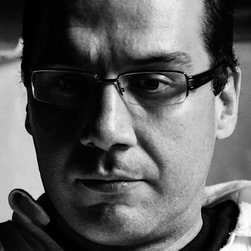 Roberto García de Mesa (Tenerife, Spain, 1973) is a poet, playwright, dramaturge, narrator, essayist, philologist, exhibition curator, stage director, visual artist and musician. He holds a licentiate in Law and a doctoral degree in Hispanic Philology. García de Mesa is a member of the Academia de las Artes Escénicas de España and leads his own theater company. He has published more than fifty books of poetry, theater, short narrative, essays, conversations and critical editions. His works have been translated into several languages, including modern Greek, and have appeared in magazines in ten countries. In Greece, Roberto García de Mesa has published the following books: Hamlet Post Scriptum (Hamlet Post Scriptum, translation by Ati Solerti, Athens, Vakxikón, 2017), Razón y canibalismo (Reason and Cannibalism, translation by Vassilis Laliotis, Athens, Bibliothèque, 2017), La edad del frío. Conversaciones con Antígona (Age of the Cold. Conversations with Antigone, bilingual edition, translation by Konstantinos Paleologos, Athens, Bibliothèque, 2018), Superficie de contacto. Retórica (Contact Surface. Rhetoric, translation by Ati Solerti, Athens, Vakxikón, 2018) and Los cuerpos remotos (The Remote Bodies, translation by Ifigenia Doumi, Athens, Bibliothèque, 2019).  Lee Lee Moss was born in Graz, Austria. After living and working in Vienna and Brussels, she spent close to twenty years abroad. Fifteen of those calling New York City home, with subsequent sojourns in Montreal, Manila and Hong Kong. Following her return to Europe, she currently divides her time between Austria and Spain. Lee Lee is a retired dancer with international performance experience, active in photography and videography, writing and translating, drawing and painting, as well as theatre and design. Ms. Moss, in line with her core pursuit of deeper meaning, further applies herself towards studies in philosophy, energy systems and consciousness. Short Fiction ~ Alan McCormick The world in mustard hue, sun toxic, sky sulphurous, the dying of light. I come with two others, the last three standing. Frances manages to find enough water for us, has kept some tea back, scraped and rinsed mould from the dry leaves, and even has a jug of coffee warming on a portable gas burner. We’ll share it out, every last drop. Mildred’s teahouse has stood in the middle of town long before I was born. It’s been through several re-vamps but has settled into its final incarnation for as long as I can remember: the bright breezy posters extoling good health and civic responsibility – ‘Don’t waste’, ‘Think before you litter’, ‘Visit your elderly neighbour with kindness and laughter’ – the tired jukebox playing old sixties and seventies songs, the same cheery satin wallpaper with forest animals in reverie chasing each other’s tails through the trees. For a long time, it existed as an outsiders’ community centre: lonely old people, young Mums with babies, poetically inclined teenagers (us bookish geeks) who rejected the local coffee chains and hipster cafes for somewhere that wasn’t trying too hard to be anything, it just was. It‘s been run by an ex nun called Frances ever since her companion Mildred died, and tonight she beckons us in, locks the door and closes the blinds as soon as we’re safely inside, clusters of thunder dropping in the neighbouring valley rattling the windowpanes, sending plumes of charring smoke to smother the clouds. Soon they’ll be coming. Frances speaks first: ‘I won’t ask you to pray, there’s no time for that. Just reach out to the person next to you and give them a hug.’ I hug old Bill Masterson; even though I’ve hated him since he aimed a shotgun at my friends and me when we were teenagers. We’d let down the tyres on his lorry because he was a bigot and was known to be cruel to his animals. But here he is up close, the stench of fear sweated through his shirt. I feel a tremble deep in the bones of his chest, a cool dampness on the skin of his arms, the weakening of what was once surely a fierce hand grip before he steps back and looks at me with small clear blue eyes and says ‘thank you, I’ve not felt another so close in years.’ A speckle of dried spit tacks like rubber onto the corner of his mouth. ‘How are you doing, Mister Masterson?’ His eyes narrow as he scrutinises me. I can tell he finds me familiar but can’t quite place me. It was years since he aimed the shotgun and I’d grown up, been away to university, and had only came back last year when we were ordered back to our home towns: ‘You’re Nicki Reardon, Charlie Reardon’s daughter,’ he says finally. ’I’m sorry about your parents, no-one should go like that, whatever they’ve done.’ ‘No,’ I say. ‘Thank you.’ ‘Why did you let down my tyres though, girl?’ ‘Not now, Mister Masterson,’ I say, and lean closer to hug him again. Last Christmas, his nephew, Gordon, had been standing on the opposite bank of the river, looking through a pair binoculars towards our house. I told my parents. ‘He’s a freak, a flag waver, ’ Dad said. ‘Just ignore him.’ ‘There are too many like him. And why are they camping there?’ Mum said. ‘Crazy idiots, they’ll fall apart soon enough, start fighting amongst themselves, they always do.’ And then came a shot, fizzing through the lounge window, plugging into the far wall. A rapid series of shots followed, the pane splintering, then giving way, the wall crumbling. I heard laughter, catcalls, others joining Gordon on the bank from the trees. They gave their sign and shouted: ‘black-loving leftie faggots going to be eaten by maggots!’ and a parting shot was fired, a bullet screaming past my ear. In the café, Frances is on the piano. A Tom Waits song, a hint of Vaudeville, a dis-coordinate waver of the keys, an asthmatic rasp: ‘You’re innocent when you dream.’ She goes on to Nina Simone’s ‘Mister Bojangles’, getting out her favourites before the end and not a dry eye in the house. ‘Coffee tastes like poison. But welcome all the same!’ shouts Mister Masterson, standing up and holding his mug in triumph. ‘Sit down, Bill,’ barks Miss Wendy, my first primary school teacher, as firm as hell. ‘I’m thanking her, Wendy, thanking her.’ ‘Well, make sure you do, and no trouble, we’ve done with trouble.’ ‘Done with trouble’: the resigned understated expression of the old. The shots had been a warning. Soon came the roadblocks. The bridge over the river was closed. We were quarantined. Starved. Electricity and phone lines cut. My parents were part of a group sent to negotiate. Days later, their bloated bloodless bodies floated back along the river, gaping tributaries of grey rotting flesh gouged into their necks. I mourned as best as I could. But I couldn’t cry; it was too much to keep my senses together or even real. Fear blew through the town like a fever, hung to our clothes, and infected those of us who were left with a deranged and unfathomable anger that couldn’t come out, and, after a while, as the hunger and cold took hold, we drew lots for the firing squad, huddled in the queue for our procession to the final solution. * There’s a line from a Shangri-La song, often played on Mildred’s jukebox: ‘he’s good bad but he’s not evil.’ Okay, Mister Masterson wasn’t ‘good bad’; he was plain bad but maybe not totally evil. ‘Blacks should keep to their place but I don’t go along with killing them.’ That was his line, and he liked to say it out loud. Black people worked for him. ‘If just they do their job, we get along fine,’ he’d say. A racist, not a killer, but now he was labelled a collaborator, the lowest of the low, a classification that had led him to Mildred’s, apart from his neighbours, apart from his kind. It was a hot night when we’d crept into the abattoir’s parking lot, the stench of dereliction and rotting carcasses seeping from his sheds. We daubed signs on his lorry, ‘Animal Killer’, ‘White Supremacist’, ‘Bow to the Holy Cow’, and let down its tyres. He arrived into the night with the steel of a shotgun glimmering from the beam of his torch. ‘What’s going on?’ he yelled. ‘Retribution,’ we shouted and laughed, hiding behind some bins, near the outer wall of his yard. But he was a wily old bastard, turned off his torch and snuck low into the dark. Soon, he had John by the scruff of the neck, dragging him into the centre of the yard. He turned the torch on his face, the barrel of the gun spotlighted at his temple. ‘John gets it if you faggots don’t show yourselves.’ One by one he started to draw us out. I was first. ‘A girl?’ he said. ‘What business has a girl misbehaving in the night?’ He looked down at John: ‘You ought to be ashamed of yourself bringing her here.’ But then his attention was taken by the last two to emerge: Marlon and Sheila. ‘Marlon Biggs and his bitch Trells! Both your fathers work for me, or at least they did until now.’ ‘That’s not fair! Please, I’ll put right all we’ve done,’ said Marlon. ‘Fair, you want fair, I’ll show you fair,’ and he smashed the butt of the gun against the side of John’s head. Marlon suddenly rushed him and the gun fired. A bullet ricocheted off the lorry into the chest of Mister Masterson’s dog that’d just appeared in the yard. We all stopped and Mister Masterson fell to his knees and let out a long anguished howl. I noticed the worn scuffed soles of his boots, mud water seeping out of the cracks, the old bastard had worked them hard. His sobbing, the whimpering of his dog, his head bowed and defeated, we should have finished him off then. I look at him now, crumpled in his seat, his fearful eyes flicking around to check we’re really okay with him, someone like him, being here, a distraction from his vigil, eyes trained onto the front door to see who might charge in. Frances slowly dances around the room. Another Shangri-La song on the jukebox: ‘He’s the leader of the pack, vroom, vroom,’ she sings, directing her attention to Mister Masterson. He grunts at her and shoos her away. She beckons Miss Wendy onto the floor: ‘Come on, Wendy, why don’t you shape some moves like you used to?’ ‘Have you gone mad?’ says Miss Wendy. ‘I have,’ she says. ‘Dregs left in heaven, coffee gone my brethren, but we know what we are about to receive and there’s no getting away from it, so I’d like some of the fun that’s owed me.’ She pulls down a rusty looking tea caddie from the shelf above the service counter. ‘Now the expiry date will be well passed but let’s not worry too much about that, shall we?’ She takes out a sheet of paper embossed in small orange squares. She peels one of the squares away from the sheet as if it was a stamp and places it on her tongue. ‘Ride the nausea, don’t let fear be your friend, just let it go and a better world will be revealed. I suggest one stamp for the uninitiated and two for those familiar,’ and she swallows another, and presents the sheet to me. ‘Nicki, take one and offer the rest around.’ I take one like a sacrament, and offer the rest to the others. ‘Mister Masterson, will you?’ ‘Why not?’ he says. ‘Miss Wendy?’ ‘I spent my life fighting against drugs, banning them from school, campaigning for better rehabilitation services for addicts so I’d be a hypocrite if I took one now.’ ‘If you’re sure?’ ‘Well, I’m not sure, Nicki, but you go ahead, I won’t report you,’ and she laughs, which sets Frances off, giggling and hooting like a hyena. In the valley the sound of explosions and thunder roll closer. I am on a path amongst a line of squat trees – brown trunks, wooden table legs – crawling on all fours – ‘never crawled to anyone’ should be writ on my tombstone, unless I be a spider, which I’m not – Bill Masterson is under the table sobbing like a baby, his coat – his dog reborn – swaddled in his arms – ‘you’ll be okay, going to look after you from now on’, his hands seemingly covered in dog blood – ‘how do you know?’ – its colour, the pedigree, human blood is . . . and when I close my eyes I see it like a river spewing from my parents’ freshly opened necks – ‘Let it go’, ‘ride’ it out Frances advised – yellow mist, stomach fumes, could sick it up or wait – I wait, Miss Wendy looks on, her primitive features full of gnarly wisdom – ‘you’re a tree,’ I tell her and she nods and maybe she smiles too – Frances is dancing like a loon, teeth chattering, raising her spent shotgun over her head like an apache – ‘help’ I yell but not a word leaves my mouth – ‘I’m not your guide, girl,’ Frances replies – and then, all of a sudden, I’m in a clearing, the voices in my head momentarily silenced – I’m crawling into the centre of the room, thunder directly above, red flashes up close against the windows – crackling, cracking – is that smoke coming in under the door? – Bill Masterson and Miss Wendy skulk out of the jungle to join me. Wendy squats down and we all hold hands, Miss Wendy’s dry like bark – a tree! – we’re humming – I can’t make out the tune but we’re hitting the same note – celestial vibrations – and then the brightest of lights as they all charge in. ~  Alan McCormick lives with his family by the sea in Wicklow, Ireland. He’s been writer in residence at Kingston University’s Writing School and for the charity, InterAct Stroke Support. His fiction has won prizes and been widely published, including in Salt’s Best British Short Stories, Confingo, Lakeview, and online at Words for the Wild, Strands, Dead Drunk Dublin, 3:AM and Époque Press. His collection, Dogsbodies and Scumsters, was long-listed for the 2012 Edge Hill Prize. He also writes shorter pieces in response to pictures by artist, Jonny Voss. See more of this collaboration, along with Alan’s own fiction at www.alanmccormickwriting.wordpress.com Poetry/Visual Art ~ Franca Mancinelli translated from Italian by John Taylor photographs by Mitar Simikić photo © Mitar Simikić whatever I can I heat up over the fire. We found a well-made saucepan. Whoever bivouacked here is perhaps already in Germany. A matter of time, money, and luck. Our guide took the money. He drinks energy drinks from black cans. It tastes like syrup for my baby. * two degrees below zero today. The sun appeared, a circle as clear as a stone. The clothes of my little one have been laid out to dry. In the steely wind of the E70 tollway. Animals that come out at night to reach the other part of the forest, die. His romper suit with hearts is smeared with mud—it rained where we slept yesterday. —I left it on this flimsy fence—there’s no time for laundry. Maybe tomorrow we cross the border. * he couldn’t speak with his friends and family anymore, nor find his bearings with the GPS. —Last night, near the fire, they were talking about an Afghan boy. He had been in the “game” for months. The last time he had come back limping on his one remaining shoe. He was trembling. All that long road from home. . . They found him not far from here. He had climbed a tree, tied himself to a branch, and let himself drop. * we can’t stay here any longer. It’s cold. We don’t have any more money. But we can have luck. Every night I pray. This morning a soul among the forks of some branches appeared to me. Corroded by the rain, it was being lacerated. Kept tightly against someone’s chest and abandoned after a long journey, now it was opening itself to the woods. An ancient voice, it was saying (...) Jericho. He was rich (...) she asked him (...) he couldn’t. (...). He ran ahead (...). * I close my eyes tight, they won’t shut. I can’t manage to wall myself up inside, cement the door. —He’s already stuck in his tool. —I close my eyes tight. I see blackness veined with red, the hazy shapes of my ancestors—he works with a pickax, my womb turned to stone. —It’s not death. It’s only one of its grafts. He keeps digging in the deserted pit. —More seconds of dark blackness. Now. Pull it out of me. Extract your rotten penis. photo © Mitar Simikić photo © Mitar Simikić photo © Mitar Simikić Note: This sequence of five prose texts by Franca Mancinelli results from a trip to Croatia in February 2018 and her participation in the European program Refest: Images and Words on Refugee Routes. She and a few other writers, artists, and photographers, from Italy, Spain, Croatia, and Bosnia and Herzegovina, were chosen to walk along the migrant trails, and to write down, draw, or photograph what they found. The sequence is set in the woods near Adaševci (Serbia), on the border with Croatia. The photos were taken by the Bosnian photographer Mitar Simikić. With the closing of the Croatian border (in March 2016), the refugees on the “Balkan Route” have found themselves trapped between a hostile bureaucracy and risky illegal itineraries. Jungle: this is what the refugees call the wooded areas where they camp out while waiting to cross the border. If discovered, they are pushed back by the police, through violence and humiliation. This is the “game” that is repeated several times, despite the detailed reports of the NGOs. The italicized fragments in the penultimate text refer to the “soul among the forks of some branches.” They are from an Arabic manuscript abandoned in the woods near the refugee camp of Adaševci. The manuscript was found by Mitar Simikić. Thanks to his photograph and to Marway Fawzi’s help, a few fragments have been translated. 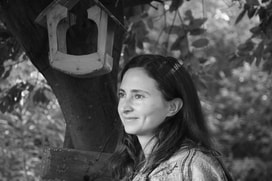 Franca Mancinelli was born in Fano, Italy, in 1981. She is widely considered to be one of the most compelling new voices in contemporary Italian poetry. Her first two collections of verse poetry, Mala kruna (2007) and Pasta madre (2013), are available in John Taylor’s translation as At an Hour’s Sleep from Here (Bitter Oleander Press, 2019). In 2018 appeared in Taylor’s translation her collection of prose poems, The Little Book of Passage (The Bitter Oleander Press). She has participated in international projects such as the Chair Poet in Residence (Kolkata, India, 2019) and Refest: Images and Words on Refugee Routes. From this latter experience was born her Taccuino croato (Croatian Notebook), published in the volume Come tradurre la neve (Anima Mundi, 2019), as well as the sequence “Jungle” that is published here. The sequence will also be included in her forthcoming Italian collection, Tutti gli occhi che ho aperto (Marcos y Marcos Edizioni, September 2020). Her blog-website (https://www.francamancinelli.com/). photo © Chiara De Luca ~ John Taylor is an American writer, critic, and translator who lives in France. Besides his translations of Franca Mancinelli’s work, he has also recently translated Philippe Jaccottet’s A Calm Fire and Other Travel Writings (Seagull Books). He is the author of several volumes of short prose and poetry, most recently The Dark Brightness (Xenos Books), Grassy Stairways (The MadHat Press), Remembrance of Water & Twenty-Five Trees (Bitter Oleander Press), and a “double book,” A Notebook of Clouds & A Notebook of Ridge (Fortnightly Review), co-authored with the Swiss poet Pierre Chappuis. John Taylor’s website (http://johntaylor-author.com/). ~ Mitar Simikić is a documentary photographer from Bosnia and Herzegovina. He is interested in photo stories in the form of series and long-term projects, a reality photography that examines social values. His website (http://www.mitarsimikic.com/).
~ Poetry ~ Michele Witthaus Three smiles on my morning walk I collected three smiles this morning from women, walking fast, rather a lot like me. Smiles that felt real; that said: we might become friends when all this is over and we spot each other in a local café. Their smiles had a quality of pathos. They were not the kind bestowed on strangers on a Boxing Day afternoon walk. Not the self-satisfied variety, infused with easy bonhomie. These were early-morning escape from lockdown smiles, generous and risky and laced with hope, and they buoyed me up all the way home. ~ Self, contained I miss you viscerally. Seeing you from a safe distance only makes it worse. When all this began, I took comfort in an aptitude for solitude; thought it would be my ally in this marathon of absence. Now, as I wander these rooms, ghost-like and alone, I understand how porous are the walls that guard my heart. Perhaps I’m not as autonomous as I had thought. ~ Emergence Far away, children go out to play together for the first time since March. Eyes blinking against the glare, they spill out onto AstroTurf. Some hanging back, cautious from the time indoors. when they learned to live without their friends. Nonetheless, they race one another, the bravest and fastest snapping the blue-and-white tape that’s flapped in the breeze for weeks, preventing access to the roundabouts and slides. Their parents watch them go, nervous smiles plastered on. As for us, we draw our brood closer, glad of the chance to wait and see what becomes of the first to go. ~  Michele Witthaus (Leicestershire, United Kingdom) Michele's poems have appeared in a variety of anthologies and other publications. Her background is in journalism and she is interested in ethical questions and ideas around sustainability. She is an active member of Leicester Writers’ Club. |
StrandsFiction~Poetry~Translations~Reviews~Interviews~Visual Arts Archives
April 2024
Categories |
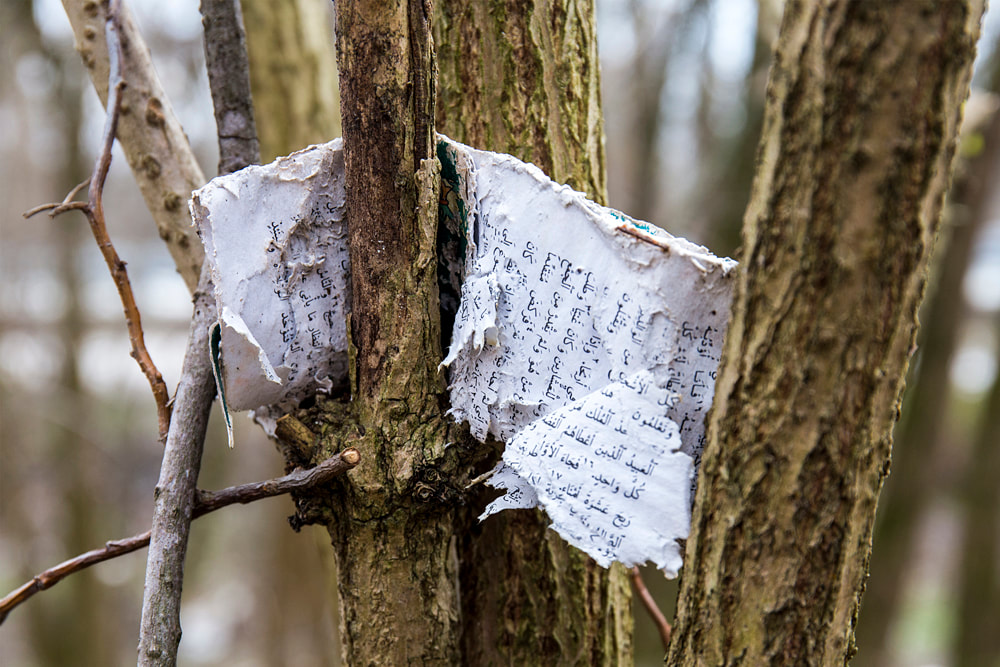
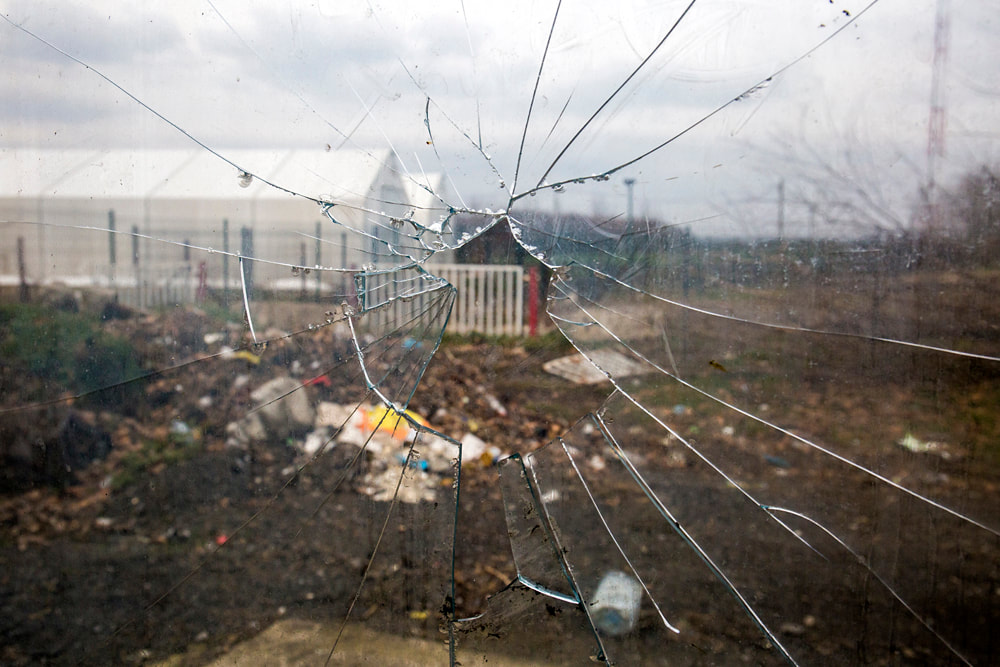
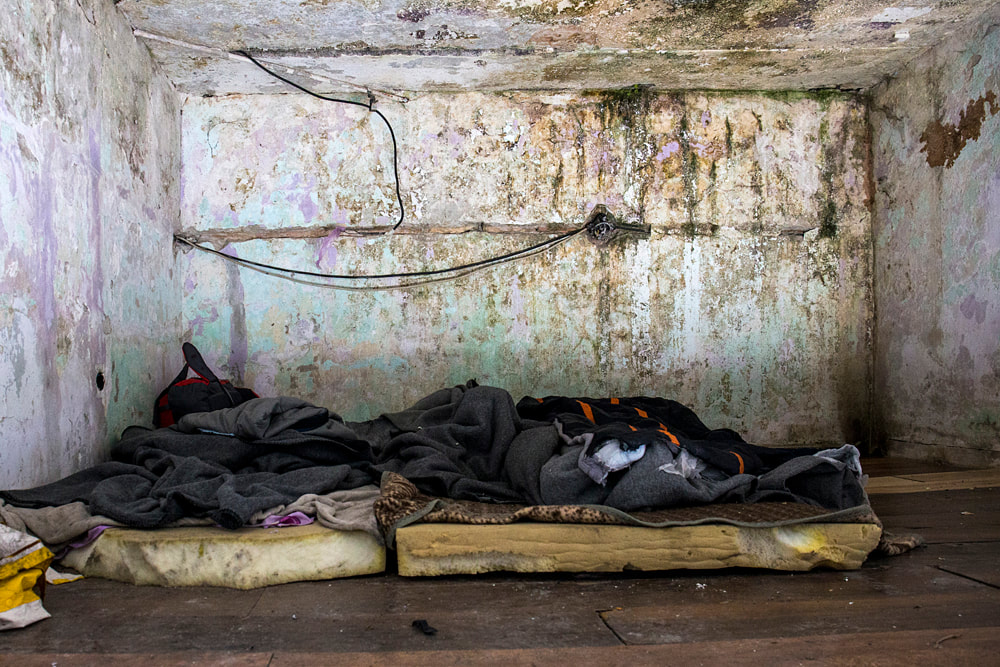
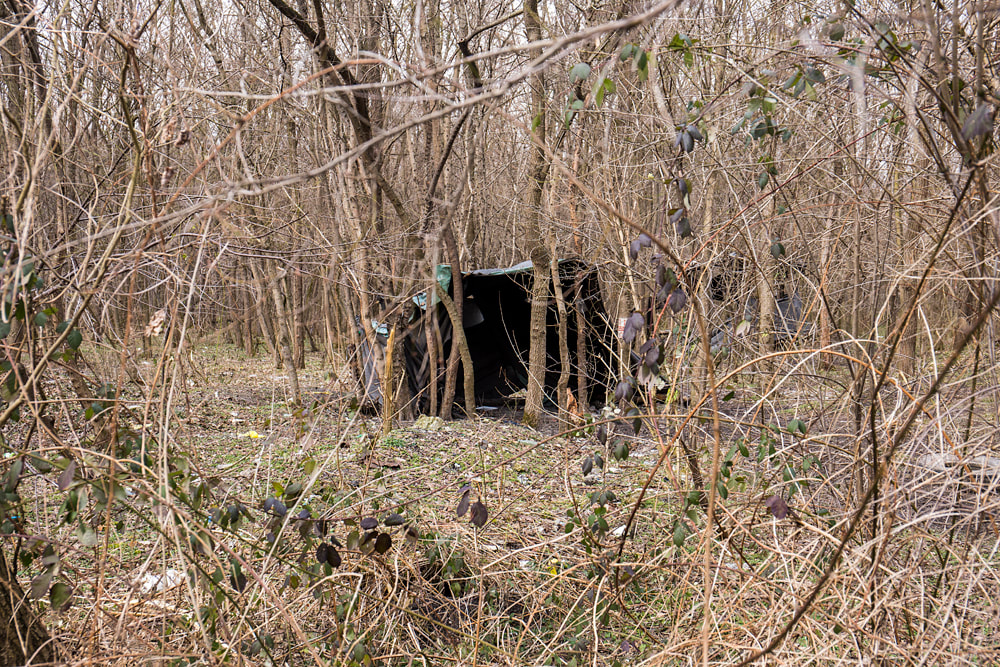
 RSS Feed
RSS Feed